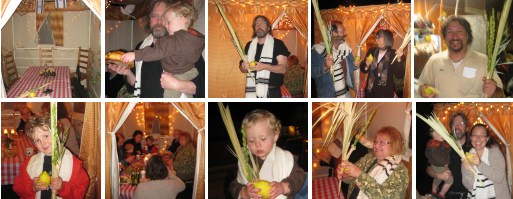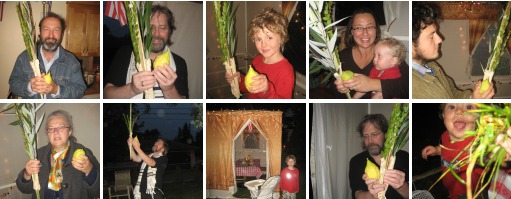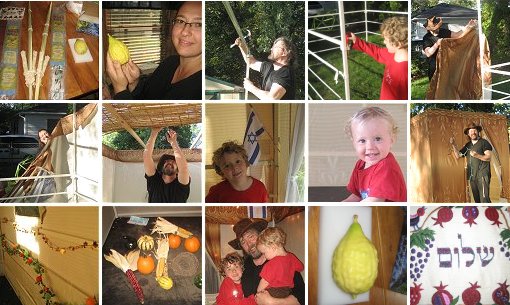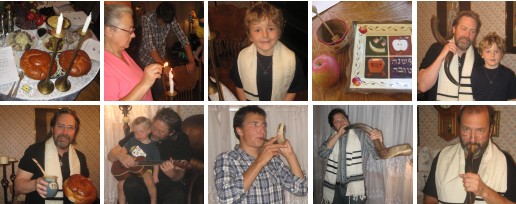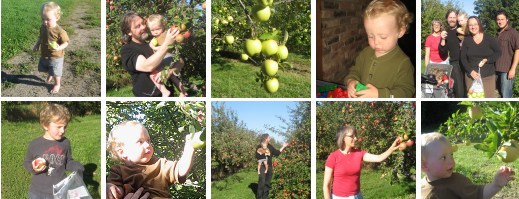|
The Fall Holidays
[ Note: For September 2010 site updates, please scroll past this entry.... ]
Preparations for the High Holidays begin a month in advance. This year, the 40-day season of teshuvah (return or repentance) runs from Elul 1 (Aug. 10th) until the end of Yom Kippur (Sep. 19th). Five days after Yom Kippur is the joyous week-long festival of Sukkot ("Tabernacles"), which is immediately followed by the celebration of Simchat Torah. Here is a simple diagram to help you visualize this season of the Jewish calendar:
The following is a list of the fall holiday dates according to the Gregorian Calendar. Note that according to the custom of the Jewish Calendar all holidays begin at sundown:
- The Month of Elul
When? Aug 10th - Sept 7th

According to Jewish tradition the month of Elul represents the time that Moses spent on Sinai preparing the second set of tablets after the idolatrous incident of the Golden Calf. Moses ascended on Rosh Chodesh Elul and descended 40 days later on the 10th of Tishri, the end of Yom Kippur. The 30 days of Elul are considered a time of selichot (prayers for forgiveness) in anticipation of the Ten High Holy Days (Tishri 1-10). For more, see this page.
Note: It is customary to blow the shofar every day of the month of Elul in anticipation of the High Holidays (see shofar blessings, below). The Selichot service occurs on September 4th, 2010.
- Rosh Hashanah
When? Wed. Sept 8th
Rosh Hashanah (ראש השנה) begins Wednesday, September 8th this year (the seventh "new moon" of the Jewish Year) and ends on Friday, the 10th. According to traditional Jewish thinking, this holiday commemorates the creation of mankind by God. The Mishnah (earlier part of the Talmud) refers to Rosh Hashanah as the "Day of Judgment" (Yom ha-Din) since all of creation owes allegiance to the Creator and is accountable to Him. The Name Elohim (אֱלהִים) revealed in Genesis 1:1 bespeaks God as the Creator and Judge of the universe (the Name YHVH, on the other hand, reveals God's compassion, as the One who intimately relates to humanity and breathes into us the breath of life (Gen. 2:4)). In Jewish tradition on Rosh Hashanah we stand before God as our personal Creator and Judge. Many Messianic Jews believe that the sound of the shofar on Rosh Hashanah is a symbol of the rapture (ἁρπάζω) of the followers of the Messiah.

Note: You can download a free Rosh Hashanah Seder Guide here.
- Yom Kippur
When? Fri. Sept 17th
Yom Kippur begins an hour before sundown on Friday, September 17th, which is a Shabbat this year. It is customary to eat a late afternoon meal with loved ones (called Seudat Mafseket, a meal of cessation), just before the fast begins (the 25 hour fast runs until an hour past sundown on Satuday, September 18th). This is perhaps the most important holiday of the Jewish Year and holds tremendous prophetic significance regarding the Second Coming of Mashiach, the restoration of national Israel, and the final judgment of the world. It is also a day that reveals the High-Priestly work of the Mashiach Yeshua as our Kohen Gadol (High Priest) after the order of Malki-Tzedek (Heb. 5:10, 6:20).

The sound of the shofar at the end of the Yom Kippur minchah (afternoon service) is called gedolah, since it signifies the "sealing of the books" for the coming year.... Yom Kippur prophetically pictures the "Day of the LORD" or the Day of Judgment in Acharit Ha-Yamim (the End of Days).
- Sukkot
When? Wed. Sept 22nd - Wed. Sept 29th
Five days after Yom Kippur marks the start of the seven-day festival of Sukkot (referred to as "Tabernacles" in the Christian tradition). It can be argued that Sukkot is the climax of all the festivals in Scripture.... Everything leads to it as a culmination in God's prophetic plan. Sukkot concludes with an additional holiday called "Shemini Atzeret," on Thursday, September 30th.

Note: The Torah Reading Cycle is suspended for the holiday week of Sukkot as well as for Shemini Atzeret (sometimes referred to as the "eighth day" of Sukkot). Sukkot, Hoshana Rabba, and Shemini Atzeret Torah readings are from Leviticus 22-23, Numbers 29, and Deuteronomy 14-16. These readings detail the laws of all of the mo'edim or "appointed times" on the Jewish calendar and include the mitzvot regarding the festival of Sukkot.
- Simchat Torah
When? Thur. Sept 30th - Fri. Oct 1st
Simchat Torah ("Joy of Torah") immediately follows the festival of Sukkot (Shemini Atzeret evening service). On Simchat Torah we conclude, and begin anew, the annual Torah-reading cycle. First we read the Torah section of V'zot Haberakhah, and then we read the first chapter of Genesis (the beginning of the next Shabbat's Torah reading).
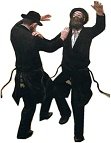
 |
September 2010 Updates
Creation and the Kingdom of Love
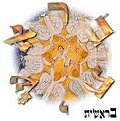
[ The following entry is related to both Simchat Torah and this week's Torah reading (Bereshit). Please first read the Torah portion to "find your place" here. ]
09.30.10 (Tishri 22, 5771) The Torah begins with בְּרֵאשִׁית בָּרָא אֱלהִים / Bereshit bara Elohim: "In the beginning God created..." (Gen. 1:1). Some of the sages say that this means, first of all, that God created the concept of time. Instead of תהוּ וָבהוּ וְחשֶׁךְ / tohu vavohu v'choshekh: "confusion and emptiness and darkness" (Gen. 1:2), the Spirit of God (רוּחַ אֱלהִים) "hovered" (like a circling dove) over the surface of the "waters of chaos" to bring order and perfection to the universe. The commentator Rashi notes that the word bereshit ("in the beginning") does not mean a chronological beginning, since the Torah then would have used the word בְּרִאשׁוֹנָה ("at first"). Instead, the word is based on the term rosh (ראשׁ, "head"), and therefore suggests what is most important, i.e., "at the head of (all things)," etc. Time is understood as a continuous cycle without historically identified beginning or end. Indeed, time itself is a "creature" that serves God's purposes...

In light of this, Rashi wonders why the Torah, which (to his thinking) is essentially a book of commandments, did not begin with the first commandment given to the people of Israel, namely the commandment to "observe" the new moon of spring (Exod. 12:2). He then draws the connection between identifying the appointed times and seasons (מוֹעֲדִים) with the rule of God over creation itself (Gen. 1:14). To fulfill the commandment to observe the new moon (and therefore the rest of the days of the year), we must first of all understand that God is the Creator of time and the One who defines the seasons of our lives... Sanctifying time is a means of expressing God's Kingship.
Before going further with all this, I think it's important to keep in mind that the New Testament identifies Yeshua as Elohim (אֱלהִים) -- the very Creator of the cosmos: בְּרֵאשִׁית הָיָה הַדָּבָר / "in the beginning was the Word" (John 1:1,14). The Divine Voice cannot be separated from God, no more than the Spirit of God can be so separated. Yeshua is the Source of all life in the universe: כָּל־הַמַּעֲשִׂים נִהְיוּ עַל־יָדוֹ / "All things were made by Him (John 1:3). The "Word made flesh" is the "image of the invisible God" and the "radiance of the glory of God and the exact imprint (χαρακτήρ, 'character') of his nature" (Col. 1:15). All of creation is being constantly upheld by the word of His power (Heb. 1:3): "All things were created by Him (i.e., Yeshua), and for Him" and in Him all things consist (συνεστηκεν, lit. "stick together") (Col. 1:16-17). Creation begins and ends with the redemptive love of God as manifested in the Person of Yeshua our Mashiach... He is the Center of Creation - it's beginning and end. As it is written: אָנכִי אָלֶף וְתָו רִאשׁוֹן וְאַחֲרוֹן ראשׁ וָסוֹף / "I am the 'A' and the 'Z,' the First and the Last, the Beginning and the End" (Rev. 22:13). Indeed, Yeshua is מֶלֶךְ מַלְכֵי הַמְּלָכִים / Melech Malchei Hamelachim: The "King of kings of kings." He is LORD of all possible worlds -- from the highest celestial glory to the dust of death upon a cross... יְהִי שֵׁם יהוה מְברָךְ / yehi shem Adonai mevorakh: "Let the Name of the LORD be blessed" forever and ever (Psalm 113:2).
(Note that accepting Yeshua as none other than YHVH "come in the flesh" is regarded as the "Absolute Paradox" by Kierkegaard. The idea of the incarnation defies rational expressions of humanistically devised religion. The New Testament's view of the Godhead transcends simplistic rational monism by revealing that love - i.e., community - is the essence of ultimate reality itself. The idea of the "triunity" of God does not impugn the Oneness of God, but it transcends rabbinical Judaism and Islam's idea of "absolute monism" by understanding oneness in reference to an eternality of intrapersonal community. In other words, Ultimate Reality is multidimensional, personal and loving, and that is part of the very essence of God. There is no such thing as a "Person" - either human or Divine - that exists in an absolute vacuum, outside of relationship. Aristotle's "Unmoved Mover" is a solipsistic illusion and logical absurdity.... Still, all this is not to suggest that the Godhead is comprehensible. Faith in Yeshua as YHVH means accepting the intersection of finitude and space/time with infinitude and eternality. It is ultimately a confession of paradox and therefore of our limited understanding of the nature of God. However, such is not without real hope in a divine love that is so great that it would divest itself of regal glory to condescend to the dust of death itself. Confessing Yeshua as LORD is to affirm that God is God of all possible worlds and circumstances. One day every knee shall bow to to Him, just as it is written in Isaiah 45:22-23 and reaffirmed in Phil. 2:10-11.)
Now that we've reminded ourselves that the Scriptures teach that Yeshua is the very Creator and Voice of the utterances of God, we can procede... The Torah records that God (אֱלהִים) began creating the heavens and the earth in the darkness of the primordial yom rishon (יום ראשון, derived from ראשׁ), the "first day" (conventionally called "Sunday" in our modern calendars). The Biblical day (יוֹם) begins in the evening: "and there was evening and there was morning, the first day." This was the "chaotic stage" of creation. From darkness would shine forth light - indeed, the divine light was the first of all God's creations (a counterpart of the "Light of the World" Himself): יְהִי אוֹר וַיְהִי־אוֹר / yehi or, vayhi-or: "Let there be light, and there was light" (Gen. 1:3). This pattern, vayhi erev, vayhi voker (וַיְהִי־עֶרֶב וַיְהִי־בקֶר), "and there was evening and there was morning," recurs for each of the six days of creation, including the sixth day, when God created man on the first Erev Shabbat. Because of this, all Jewish holidays begin at night (and also because of this, Christians understand yom rishon to be a picture of both the resurrection of Yeshua and the recreated heavens and new earth).
According to Jewish tradition, this first Erev Shabbat was also Rosh Hashanah, the "head of the year." Rosh Hashanah therefore represents the day that God began to rule as King of the Universe. When Adam first opened his eyes and human consciousness was born, he immediately understood that the LORD created all things, including himself. According to midrash, Adam's first words were, יהוה מֶלֶךְ עוֹלָם וָעֶד / Adonai malakh olam va'ed: "The LORD is King for ever and ever." God then said, "Now the whole world will know that I am King," and He was very pleased. This was the "tov me'od" (טוֹב מְאד) moment of creation, when God saw all that He had made "and found it very good" (Gen. 1:31). The birthday of humanity is therefore the Coronation Day for the King of the Universe. This also explains why each Shabbat we remember God as our creator. Indeed, among Orthodox Jews, Erev Shabbat is considered the "gateway" back to the Garden of Eden....
According to the sages, the goal or purpose of God's creative activity was the building of a kingdom based on divine love (מַלְכוּת הָאֱלהִים). As King David wrote, עוֹלָם חֶסֶד יִבָּנֶה / olam chesed yibaneh: "The world is built with chesed" (Psalm 89:3[h]). The world itself is to built upon the foundation of God's love (חֶסֶד, chesed) as it is expressed in the lives of the tzaddikim (the righteous). Indeed, the very first mitzvah (commandment) given to mankind was simply פְּרוּ וּרְבוּ / pru urvu: "be fruitful and multiply" (Gen. 1:28). The family, then, is a picture of a nurturing community based on chesed. For the Christian, this "family building" is centered on Yeshua the Messiah, the true King of the kingdom and the rosh pinnah (ראשׁ פִּנָּה), or "corner stone" of the Temple of God (see Heb. 3:1-6).
The first "lo tov" (לא־טוֹב / "it is not good") statement made by God concerned Adam's state of solitude in the garden. Adam needed a companion, an ezer kenegdo (עֵזֶר כְּנֶגְדּוֹ), a "helper opposite to him." The sages note that Chavah ("Eve") could either function as Adam's helper (ezer) or his opponent (mitnaged) depending on his merit. Note that Eve was not created to be in subservience to Adam. Indeed, Chavah was the "finishing touch" of Adam, a more refined and sensitive counterpart. Chavah would mirror back to Adam the middot (qualities) of himself... Indeed, in the "genealogy" of humanity, we see that Adam, the firstborn "son of God," comes from adamah (אֲדָמָה, "earth") whereas Chavah, whose name means "life," is related to the verb (חָוַה) that means to "declare" or reveal (Psalm 19:3). Chavah is called em kol-chai (אֵם כָּל־חַי), the mother of all living (Gen. 3:20), and as such, she also is a picture of God, the "feminine" aspect of God suggested by the divine Name, El Shaddai (shadayim means "breasts").
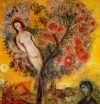
Why was Adam created on the sixth day, from the dust of the earth? Why wasn't he created yesh me'ayin ("ex nihilo") like the angels? The sages answer that this was intended to instill humility in all of us, since even a gnat has an earlier lineage than does the first man. And yet creation itself was designed to express the Kingship of God, and for that man was needed. Man is made from the lowliest substance of earth (dust is next to nothingness itself) and yet he is imparted with nishmat chaim (נִשְׁמַת חַיִּים), the "breath of souls." Mankind functions as a "bridge" between the material and spiritual worlds, and through mankind creation itself is sanctified.
In a discussion regarding capital punishment, the Talmud states: "If someone strikes many coins from one mold, they all resemble one another, but the King of Kings, the Holy One, Blessed be He, made each man in the image of Adam, and yet not one of them resembles his fellow. Therefore every single person is obligated to say, bishvili nivra ha'olam (בִּשְׁבִילִי נִבְרָא הָעוֹלָם), "The world was created for my sake" (Mishnah Sanhedrin 4:5). This is why murdering another human being created b'tzelem Elohim (in the image of God) is considered so horrendous. The sages reasoned that whoever destroys a single soul is accounted as if he had destroyed the whole world; and whoever saves one soul is accounted as if he had saved the entire world. Hence the Torah (Gen. 4:10) records "The voice of the bloods of your brother cries out to me" (קוֹל דְּמֵי אָחִיךָ צעֲקִים אֵלַי). It was not merely the innocent blood of Hevel that cried out, but rather the blood of all his ancestors who were destroyed along with him.
On the other hand, each of us must remember (as did father Abraham) that we are afar ve'efer - "dust and ashes" (Gen. 18:27). While it is true that we are esteemed by God as His image bearers, our flesh (basar) comes from the dust of the ground. Even our beloved Lord Yeshua clothed Himself in such dust, demonstrating the ultimate form of humility and compassion for us (Phil. 2:7).
An old chassidic tale says that every person should walk through life with two notes, one in each pocket. On one note should be the words bishvili nivra ha'olam (בִּשְׁבִילִי נִבְרָא הָעוֹלָם) -- "For my sake was this world created," and on the other note the words, anokhi afar ve'efer (אָנכִי עָפָר וָאֵפֶר) -- "I am but dust and ashes."
 |
Values like love, beauty, and truth are not empirical concepts. We do not find them in a test tube or infer them from the facts of experience. On the contrary, we bring them to our experience as image bearers of God, attesting to the wonder of creation and our place within it. The human soul (נְשָׁמָה, neshamah) is not something that a physicist or behavioral psychologist can reduce to other terms, but is an irreducible part of our existence, just as our need for love is itself ineradicable. Human dignity and worth are therefore the result of the love of God as revealed in Yeshua our Messiah.
The goal or purpose of God's creative activity was the building of a kingdom based on divine love (מַלְכוּת הָאֱלהִים). As King David wrote (and Yeshua likewise preached), עוֹלָם חֶסֶד יִבָּנֶה / olam chesed yibaneh: "The world is built with chesed" (Psalm 89:3[h]). The "corner stone" of the Temple of God (i.e., rosh pinnah, ראשׁ פִּנָּה) is the love and kindness of the King of king of kings, Yeshua the Creator, of whom it is written: "Worthy are you, our Lord and God, to receive glory and honor and power, for you created all things, and by your will they existed and were created" (Rev. 4:11).
Note: The foregoing just scratches the surface of a few key topics related to this week's Torah reading. Later I hope to discuss the fall of man, the serpent in the garden, and so on, as time permits. Shalom for now.
 |
Celebrate the Living Torah!
[ The following entry is related to Vzot HaBerakhah, the final portion of Torah that is always read during the holiday of Simchat Torah... ]
09.30.10 (Tishri 22, 5771) The climax of the festival of Sukkot is called Simchat Torah ("Joy of Torah"). On Simchat Torah we conclude, and begin anew, the annual Torah-reading cycle. First we read the Torah section of V'zot Haberakhah, and then we read the first chapter of Genesis (the beginning of the next Shabbat's Torah reading). The idea that Torah study is cyclical finds expression in the joyous ritual of dancing around and around the Torah, known as hakkafot.
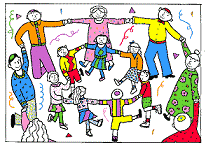
Since Yeshua the Mashiach (Jesus Christ) is Torah Ha-Emet - the True Torah - we should likewise celebrate the Joy of Torah in our lives. Yeshua is the Living Torah, the Living Word, written upon our hearts so that we can truly dance and embrace the Truth given from God. Indeed, Yeshua did not come to destroy the Torah but rather to fulfill it in our lives (Matt. 5:17-20). As it is written in the Tanakh regarding the New Covenant:
"Behold, the days come, saith the LORD, that I will make a new covenant (B'rit Chadashah) with the house of Israel, and with the house of Judah: Not according to the covenant that I made with their fathers in the day that I took them by the hand to bring them out of the land of Egypt; which my covenant they brake, although I was an husband unto them, saith the LORD: But this shall be the covenant that I will make with the house of Israel; After those days, saith the LORD, I will put my law (Torah) in their inward parts, and write it (the Torah) in their hearts; and will be their God, and they shall be my people. And no longer shall each one teach his neighbor and each his brother, saying, 'Know the LORD,' for they shall all know me, from the least of them to the greatest, declares the LORD. For I will forgive their iniquity, and I will remember their sin no more." - Jeremiah 31:31-34
This very idea is clearly re-affirmed in the New Testament (see Heb. 8:8-11). As Christians, then, we have the greater reason to celebrate Torah, since Yeshua (Jesus) is of course the Central Message of the Torah -- its inner meaning and incarnation.
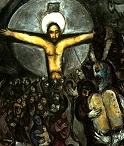
Yeshua is the Torah made flesh (John 1:14), the faithful Mediator of the New and Better Covenant (Heb. 8:6), and He does what Moses and the Sinatic covenant could never do, namely, write the Torah within our inward parts and upon our hearts so that we might truly be the people of God (Jer. 31:31-34). Though His was the Voice that spoke the law to Moses, by means of His sacrificial death Yeshua graciously fulfills the righteous demands of Torah on our behalf, and the LORD is glorified as both just and merciful (i.e., the justifier of those who put their trust in Him). By means of His sacrificial suffering, we are now enabled to truly dance!
The Torah (i.e., law) is holy, just and good (Rom. 7:12), but those seeking righteousness based on it's demands will discover the tragic fact that it is powerless to impart righteousness and life (2 Cor. 3:7-18). It is sin within the human heart that condemns people - not the Torah. The crucifixion of Yeshua condemned sin in the flesh (again, it did not condemn the Torah) and now the righteousness of God is imparted to those who embrace Yeshua by faith (Rom. 8:3-4). Enabled by the Holy Spirit, with the Torah now written upon our hearts (Jer. 31:31-3; Heb. 8:10-11), we are empowered to fulfill the requirements of the law based on a new covenant relationship with God (Gal. 2:16, 3:2). We no longer seek righteousness by means of maintaining ritualistic or other ordinances (Rom. 4:5, Gal. 2:16) but by receiving the free gift of Mashiach's righteousness imputed to us through our trust (Eph. 2:8-9). Because of Yeshua's victory, we do not strive for acceptance before the Father, we abide within it, chaverim…
Note: This is an ideal time for you to join the weekly Torah readings that are studied by Jews all over the world.
 |
Chazak! Chazak!
09.30.10 (Tishri 22, 5771) If you have been regularly reading and studying Torah with me, rejoice that we have completed the last book of Torah (Devarim) and are now begining anew with Bereshit (Genesis).

During the concluding pasuk of each book of the Torah it is customary for the congregation to stand as the Torah reader reads the final words. Then, in a dramatic manner, he signals to the congregation, who then respond with "Chazak, chazak, ve-nit chazek" (Be strong, be strong, and let us be strengthened!):

This is a cry of encouragement to continue with the reading of the next book, and to return to this one again in due course. This custom may be derived from the words of Joshua to the children of Israel, "chazak ve'ematz" (be strong and courageous).
The Hebrew greeting Yasher Koach! means "May your strength be firm," and is often said to those who have had performed Torah reading aliyah at synagogue.
Note that the Hebrew Scriptures begin -- not from the first person perspective of some man's understanding of God -- but from an omniscient third person perspective, a Voice that reveals the Glorious Power that created the entire cosmos by means of His Word. The very first verse of the Bible, then, reveals the triune nature of God, further indicated by the use of the plural form of the name Elohim with the singular verb bara (he created). Indeed, in this very first parashah we a read a direct quotation from this Elohim that uses plural personal pronouns: "Let us make man in our image and in our likeness." Ultimate reality therefore is not some sort of monism wherein God is seen as an abstract monolithic Power that created all things (like an Unmoved Mover), but is echad (one) in a sense that is inherently relational, personal, and the expression of everlasting love.
 |
Every Letter of Torah
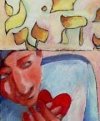
[ The following entry is related to Vzot HaBerakhah, the final portion of Torah that is always read during the holiday of Simchat Torah... ]
09.29.10 (Tishri 21, 5771) This week's Torah portion (for Simchat Torah) is called Vzot HaBerakhah ("this is the blessing"), which is also the last portion of the entire Torah. After reading this portion, we will "rewind the scroll" back to parashat Bereshit to begin reading the scroll all over again. We do this every year because Talmud Torah - the study of Torah - is a cyclical venture that equips us to better understand the Scriptures - including the New Testament.... In this connection, it is interesting to note that the first letter of the Torah is a Bet (בּ) in the word bereshit (בְּרֵאשִׁית), and the last letter of the Torah is a Lamed (ל) in Israel (יִשְׂרָאֵל). Putting these together, we get the word lev (לֵב), "heart," suggesting that the entire Torah - from the first letter to the last - reveals the heart and love of God for us.

Vzot HaBerakhah contains Moses' last words to the people before his death on Mount Nebo in the land of Moab. According to midrash, when God came and told Moses to get ready to depart from this world, he appealed to God saying, "Wait until I bless Israel. All my life they have had no pleasant experiences with me, for I constantly rebuked them and admonished them to fear God and fulfill the commandments. I do not wish to leave this world before I have blessed them" (Ginzberg: Legends of the Jews).
The portion therefore begins, "And this is the blessing (וְזאת הַבְּרָכָה) with which Moses the man of God (אִישׁ הָאֱלהִים) blessed the people of Israel before his death" (Deut. 33:1). It is unclear if Moses' blessing was later appended to the Book of Deuteronomy by a scribe, or if Moses himself wrote about himself in the third person; nonetheless, the blessing begins with a poetic metaphor of God shining the Divine Light from Sinai: "The LORD came from Sinai and dawned (זָרַח) from Seir upon us; he shone forth from Mount Paran; he came from the ten thousands of holy ones, with a fire of knowledge (אֵשׁ דָּת) at his right hand" (Deut. 33:2). The blessing continues by stating that God's revelation was based on His love: "Yes, he cherished (חָבַב) his people, all his holy ones were in his hand; so they followed in your steps, receiving words from you, when Moses commanded us Torah as a heritage (מוֹרָשָׁה) for the congregation of Jacob" (Deut. 33:3-4). According to the sages, the word translated "heritage" in this verse (i.e., morashah) refers to a spiritual (rather than physical) inheritance that will abide forever. Maimonides further notes that the verse refers to the "congregation" (קְהִלָּה) of Jacob, not exculsively to the physical "seed" (i.e., natural descendants) of the Jewish people.... This implies that the Torah would become an inheritance for all those who would congregate with Jacob. All who are "grafted in" to Israel are therefore members of "God's congregation" (John 10:16; Rom. 11:16-24).
The revelation at Sinai was a coronation of God as the loving King of Israel: "Thus the LORD became king in Jeshurun (i.e., יְשֻׁרוּן, a poetic name for Israel based on the verb yashar, "straight," or upright"), when the heads of the people were gathered, all the tribes of Israel together" (Deut. 33:5). There is some discussion among the sages as to why Moses blessed the tribes in the order he did, and why the tribe of Simeon is missing (compare Jacob's blessing of the tribes in Gen. 49:1-28). Nachmanides comments that the order of the blessings was prophetic since they followed the tribe's future settlement. Thus, for example, Reuben is mentioned first because he was the first tribe to settle in Gilead, east of the Jordan (Josh. 13:15-23). Judah is mentioned next because he was the first to settle in the Promised Land itself (Josh 15; Judges 1:2). As to why Simeon is not mentioned, it is thought that this goes back to the incident at Shechem when Levi and Simeon brutally exacted revenge for the rape of their sister Dinah (Gen. 34). The tribe of Levi underwent teshuvah (as Moses mentioned in Deut. 33:9 because they refused to participate in the sin of the Golden Calf), though the tribe of Simeon had not. As it happened, the tribe of Simeon was later assimilated into the other tribes of Israel and did not have its own territory, whereas the tribe of Levi became itinerant Torah teachers of Israel (Deut. 33:10). Moses goes on to bless the remaining tribes, with a closing statement, "Happy are you, O Israel! Who is like you, a people saved by the LORD, the shield of your help, and the sword of your triumph! Your enemies shall come fawning to you, and you shall tread upon their backs" (Deut. 33:29).
After blessing the tribes, Moses went up from the plains of Moav to ascend Mount Nebo, where the LORD supernaturally revealed to him all the Promised Land. As Moses beheld the glory of the land, the LORD said to him, "This is the land of which I swore to Abraham, to Isaac, and to Jacob, 'I will give it to your offspring.' I have let you see it with your eyes, but you shall not go over there" (Deut. 34:4). The midrash relates that Moses then argued with God for his life and sought to overturn God's earlier decree by appealing to the Thirteen Attributes of Mercy implied in the Name YHVH (יהוה). God, however, refused Moses' request because of six serious sins that he had commited. First, Moses had initially refused to deliver the Jews (Exod. 4:13) and then later accused God of making conditions bad for Israel by not immediately delivering the people (Exod. 5:23). After the Exodus itself, Moses tested God twice during Korach's rebellion (Num. 16:29-30) and he further slandered the people on two separate occasions (Num. 20:10; 32:14). For these reasons Moses was forbidden to enter the Promised Land and died upon Mount Nebo in the land of Moab. "Moses was 120 years old when he died. His eye was undimmed, and his vigor unabated, and the people of Israel wept for Moses in the plains of Moab thirty days" (Deut. 34:7-8). God Himself buried Moses in an unknown place. According to Jewish tradition, Moses died on Adar 7.
Joshua the son of Nun was then established as Moses' successor among the people and the Torah concludes by affirming that "there has not arisen a prophet since in Israel like Moses, whom the LORD knew face to face (פָּנִים אֶל־פָּנִים) ... for all the mighty power and all the great deeds of terror that Moses did in the sight of all Israel" (Deut. 34:10-12).
During the concluding verse of each book of the Torah it is customary for the congregation to stand as the final words are recited. Then, in a dramatic manner, the Torah reader signals to the congregation who then begin chanting: Chazak, chazak, ve-nit chazek (חָזַק חָזַק וְנִתְחַזֵּק) - "Be strong, be strong, and let us be strengthened!" This is a cry of encouragement to continue with the reading of the next book, and to return to this one again in due course. Torah study is an "unending circle" in which we hopefully discern more and more of God's revealed truth... May God help each one of us...
The Hebrew exclamation, "Yasher Koach!" (יָשֶׁר כּחַ) means "May your strength be firm," and is often said to congratulate people who have succeeded in their Torah studies. For those of you who have studied Torah over this last Jewish year, let me extend to you a heartfelt "Yashar Koach!" And since we are finishing the entire Torah cycle for this year, it is customary to enjoy a festive party (i.e., a siyyum: סִיּוּם) celebrating the completion of the study of a Jewish text. Studying the Torah is a great joy, chaverim, since it reveals the truth to us and helps us understand the LORD of Glory. As King David said, "You make known to me the path of life (ארַח חַיִּים); in your presence there is fullness of joy (שִׂמְחָה); at your right hand (i.e., with a fire of knowledge (אֵשׁ דָּת) at His right hand) there are pleasures forevermore" (Psalm 16:11).
 |
Hoshana Rabba

[ The following entry is related to the Holiday of Sukkot ("Tabernacles"), which runs from Sept. 23-30th this year....]
09.29.10 (Tishri 21, 5771) In Jewish tradition, the High Holidays do not end until the seventh (and final) day of Sukkot, called "Hoshana Rabba" (הוֹשַׁנָא רַבָּא). Hoshana Rabbah means the "Great Salvation," and was regarded by the rabbis as a mini-Yom Kippur, the day on which the divine decrees made on Rosh Hashanah and sealed on Yom Kippur are actually sent out to be fulfilled. According to the Mishnah (Sukkah 4:5), during the Temple period, willow branches were placed around the altar and a parade was made around the altar while the people recited: Hoshi'ah na (הוֹשִׁיעָה נָּא) - "Save us, please!" (Psalm 118:25).
Pictures from our Hoshana Rabba celebration
Based on the ancient Temple practice, most Sukkot synagogue services include the custom of waving the etrog/lulav while making a circuit (hakkafah) around the pulpit while everyone sings praise (hallel). On Hoshana Rabba - the climactic seventh day of Sukkot - there are seven circuits (hakkafot) around the sanctuary, and additional hymns are sung. For more information about the synagogue customs, see the Hoshana Rabba page.
Sukkot and Freedom

[ The following entry is related to the Holiday of Sukkot ("Tabernacles"), which runs from Sept. 23-30th this year....]
09.29.10 (Tishri 21, 5771) It's been said that while it took the LORD 40 days to get Israel out of Egypt, it took 40 years to get Egypt out of Israel.... When Israel first left Egypt, they took with them only enough food and water to last for a few days. When these provisions ran out, so did their trust in God. Therefore Sukkot recalls the miracles that God provided to keep His people from returning to Egypt. These miracles - the water from the rock (i.e., "Miriam's Well"), the manna from heaven, the Clouds of Glory - were surely as great as the judgments upon Egypt and the splitting of the Sea of Reeds, and yet the exodus generation never took hold of their new identity as God's redeemed (and therefore free) children... Tragically, the Israelites regularly vacillated between fear and rebellion and thereby forfeited the promises of God. They could not take hold of God's blessing because of their unbelief.
Sukkot remembers the journey of the redeemed people of God - first from Egypt, then to Sinai, and then into the void of the desert places.... The repeated failures of the Israelites in the wilderness was meant to reveal the insufficiency of "Egyptian thinking" by demonstrating God's faithful love and ongoing care. The entire ordeal in the wilderness was a "Sukkot experience" that pointed beyond Sinai....
The holiday of Sukkot symbolizes the journey of this life by means of erecting a sukkah - a flimsy shelter that we are to "live in" for seven days. The sukkah is meant to help us ask ourselves: Where is the true home we seek? Where is the true shelter of our lives? The first Jew (Abram) was called ha-ivri (הָעִבְרִי) - "the Hebrew," a term that means "one who has crossed over" (עָבַר) from another place. When he heeded the call Lekh lekha (לך־לך), "go for yourself," it was Abram's walk of faith that made him into a Jew.... He left the comforts of Ur to become a tent dweller who became a "stranger and sojourner" with God. Similarly, the Jewish people as a whole were forced to leave the "security" of Egypt and journey into the unknown in order to realize the promises of God. Sukkot ultimately reminds us that our security is neither found in political power structures nor in the concrete walls of our homes, but solely in the Presence of God. Our freedom as God's children is at stake in the matter of redemption, and God takes it very seriously when we seek to exchange any supposed source of security for the venture of true faith....
So where is the true home you seek? Are you clinging to hope in this world and its counterfeit security? Are you willing to sacrifice your dignity as a child of God for the protection of the State? When God redeemed Israel from Egypt, it was a rebirth experience. Passover represented the means of redemption (the blood of the lamb), Shavuot represented the revelation of the holiness of God (the Sinai experience), and Sukkot represented the walk of faith as reborn and redeemed children. God took Israel out of Egypt (i.e., out of the world) in order to reveal to them who He is -- and who they were in relationship with Him.... The pattern remains the same. The world system is a form of slavery, and Sukkot reveals how God bypasses the world to care for His people...
The holiday of Sukkot reminds us that slavery is not an option for the redeemed people of the LORD. God wants us to be free from the bondage of our past. We must leave behind our old identities and foreswear our sense of victimization and dependency on anything other than God himself. That is the wilderness experience of faith. God calls us to walk in the Presence of His love, not in the fear of man. We are new creations in the Messiah, reborn to take possession of the promises God has given to us. "For our citizenship (πολίτευμα) is in heaven, from which also we eagerly wait for a Savior, Yeshua the Messiah our LORD (אֲדנֵינוּ יֵשׁוּעַ הַמָּשִׁיחַ), who will transform the body of our humiliation (τὸ σῶμα τῆς ταπεινώσεως ἡμῶν) to be like his glorious body, according to the working of His power that enables Him even to subject all things to Himself" (Phil. 3:20-21).
Shalom and Sukkot Sameach, chaverim....
 |
Prayer Request

09.26.10 (Tishri 18, 5771) I am still feeling ill, chaverim, and ask (again) for your prayers for my healing... I was hoping to add some further thoughts about Sukkot and to add some commentary to the Book of Ecclesiastes today, but I have not felt well enough to write effectively. I am in a dry and desolate place.... Thank you for your prayers.
מַהֵר עֲנֵנִי יְהוָה כָּלְתָה רוּחִי
ma·heir a·nei·ni Adonai, ka·le·tah ru·chi
"Hear me speedily, O LORD: my spirit faileth" (Psalm 143:7)
Sukkot and Vanity....

[ The following entry is related to the Holiday of Sukkot ("Tabernacles"), which runs from Sept. 23-30th this year....]
09.24.10 (Tishri 16, 5771) Though Sukkot is called the "Season of Our Joy" (z'man simchateinu), it might surprise you to learn that the somber Book of Ecclesiastes (קהֶלֶת) is always recited on the Sabbath of the festival. According to midrash, this custom arose during the First Temple period, when the Jews would visit King Solomon to pay their respects during the holidays: "And all the men of Israel assembled to King Solomon at the feast in the month Ethanim, which is the seventh month [i.e., Tishri]" (1 Kings 8:2). On that occasion the King taught the nation Kohelet (Ecclesiastes) as an antidote to the lightheartedness and gaiety associated with the festival of Sukkot. "Vanity of vanities, says Kohelet, vanity of vanities! All is vanity" (Eccl. 1:2). In light of the inevitability of death and decay, praiseworthy is the man who accepts the passing shadows of his days, and who realizes the emptiness of pleasures, wealth, and worldly ambition. Like the sukkah itself, Kohelet reminds us of the transitory nature of life in olam ha-zeh (this world). Therefore Solomon admonishes us to soberly remember that God is our Creator and Judge: "Fear God and keep his commandments, for this is the whole duty of man. For God will bring every deed into judgment, with every secret thing, whether good or evil" (Eccl. 12:13-14).
The Holiday of Sukkot also recalls the Clouds of Glory during the Exodus. The commandment, "You shall dwell in booths for seven days" (Lev. 23:42) is therefore said to commemorate the sheltering Presence of the Shekhinah - not to recall that the Jews lived in temporary structures in the wilderness. God commanded the observance of this holiday "so that future generations will know that I had the children of Israel live in booths when I brought them forth from Egypt" (Lev. 23:43). The miracle is the sheltering presence of God - not the booths themselves. The sukkah therefore functions as a sign that God loves us, that He delights in our well-being, and that He tenderly protects us from hardship. Were it not for God's constant care, we would perish in the wilderness of this world...
Trusting in the love of God enables us to behold His surrounding presence and glory. Thus says the LORD, "I remember the devotion of your youth, your love as a bride, how you followed me into the wilderness, to a land not sown" (Jer. 2:2). Rashi notes that the goal of the Exodus (i.e., redemption) was to "bring the beloved into the King's chambers" (Song. 1:4). Still, this required that the beloved was to be "made ready" to receive God's embrace. Therefore, when the LORD delivered Israel from bondage in Egypt, He did not take them on the "fast track" to the Promised Land (though He certainly could have done so). No, there was a circuitous route to take, a divinely appointed wandering, a Divine "stroll of betrothal," if you will. In order to reveal Himself to the Israelites, God had to led them directly into the desert. He sheltered them in Clouds of Glory. He embittered waters to make them sweet once again; He let stomachs growl to provide the Bread of life; He parched mouths to give Living Water from the "Rock that was struck" (1 Cor. 10:4). God did all this to reveal to his newly redeemed people that He is the satisfaction of all their longings... He rescued his bride from the house of slavery and now wanted to refine her to receive greater revelation to come. He was "wooing" or "courting" her in order to bring her beneath a canopy of stars at Sinai, and He needed them to dwell as strangers with Him in the desert in order for them to take hold of His love...
 |
Pictures from our second night of Sukkot
הוֹדוּ לַיהוה כִּי־טוֹב כִּי לְעוֹלָם חַסְדּוֹ
ho·du la·Adonai ki-tov, ki le·o·lam chas·do
"Give thanks to the LORD, for he is good, for his steadfast love endures forever."
Download Study Card
Our Erev Sukkot Celebration

[ The following entry is related to the Holiday of Sukkot ("Tabernacles"), which runs from Sept. 23-30th this year....]
09.23.10 (Tishri 15, 5771) "On the first day [of Sukkot] you shall take to yourselves the fruit of the goodly tree, branches of palm trees, boughs of leafy trees and willows of the brook, and you shall rejoice before the Lord your God seven days" (Lev. 23:40).
Last evening we celebrated the first day of Sukkot with my in-laws. Though the weather was rainy, we waved our lulavs, prayed, and ate within our sukkah (later we covered the roof with a tarp to avoid getting drenched). Here are some pictures from the evening, chaverim:
In Jewish tradition, after reciting the Hebrew blessing and shaking the lulav around, it is customary to recite (or sing) the following antiphon from Psalm 136:
הוֹדוּ לַיהוה כִּי־טוֹב כִּי לְעוֹלָם חַסְדּוֹ
ho·du la·Adonai ki-tov, ki le·o·lam chas·do
"Give thanks to the LORD, for he is good, for his steadfast love endures forever."
Download Study Card
Indeed, is there any better reason to give thanks to the LORD than because of His steadfast love, i.e., His chesed (חֶסֶד)? Is there anything greater than the astounding love of God? Can anything overcome it? Can even the hardness of your own heart somehow veto or negate it's purposes? It was because of His great love that God (יהוה) "emptied Himself" of heavenly glory, becoming clothed in human flesh and becoming disguised a lowly slave (δοῦλος). God performed this act of "infinite condescension" in order to "tabernacle" with us as our "hidden King" (John 1:1,14, Phil. 2:7-8). Your neshama (soul) is the "Shulamite woman" he came to woo so that you might "come into His tent" -- willingly, from the heart (Song of Solomon).
When we receive Yeshua as the Lover of our souls (kabbalat Yeshua), we abide in the hope of love that awaits future consummation in the world to come... Meanwhile, we are "suspended between worlds," though the veil of this world has been rent asunder and we may now appear before the LORD in the realm of the spirit by faith. We can come "boldly" before the Throne of Grace (παρρησίας τῷ θρόνῳ τῆς χάριτος) to find help for our lives (Heb. 4:16). Note that the word translated "boldly" in this verse (παρρησίας) comes from πᾶς (all) + ῥέω (to utter), suggesting that we can speak freely to God and share everything within our heart without fear or shame. We do not need to conceal ourselves from the Divine Light -- any more than we need to perform arabesque rituals or offer any "prescribed prayers" to access Him. We who are trusting in God's sheltering love understand the LORD to be our loving Savior and Redeemer. In our brokenness we can bare our souls before Him without fear ("there is no fear in love" - אין פַּחַד בָּאַהֲבָה). We can express "all our heart" to the LORD and be assured that He will help us in our hour of need (Heb. 4:16).

God loves the little children and never prevents them from coming to Him: "for to such belongs the kingdom of heaven" (Matt. 19:14, Mark 10:14). O praise and thank God for Jesus, chaverim! What we we do without Him?
Shalom and blessings to you all in our Lord Yeshua the Messiah - the One who "tabernacles" with us in the Holy Spirit and who graciously invites all to come within the shelter of His everlasting love. וַיְהִי בְשָׁלֵם סֻכּוֹ וּמְעוֹנָתוֹ בְצִיּוֹן / vayehi v'shalem sukko, u'me'onato v'Tzion: "His sukkah is in Shalem; His place in Zion" (Psalm 76:3). The world is under divine judgment, but those who trust in the LORD can say along with King David: יִצְפְּנֵנִי בְּסֻכּה בְּיוֹם רָעָה / yitzpeneni b'sukkoh b'yom ra'ah, "He will conceal me in His sukkah in the day of trouble" (Psalm 27:5).
Whether you have the opportunity to wave the lulav in a Sukkah or not this year, we sincerely wish you a season of joy as you celebrate the sheltering presence of the LORD Yeshua in your life, chaverim... Chag Sameach!
 |
Building our Sukkah
[ The following entry is related to the Holiday of Sukkot ("Tabernacles"), which runs from Sept. 23-30th this year....]
09.21.10 (Tishri 13, 5771) Happy New Year - Shanah Tovah - chaverim! Today we assembled our sukkah for the holiday of Sukkot (which begins tomorrow at sunset). It was a sunny and mild day here in Minnesota. Here are a few pictures of the event:
Left-to-right (top): 1. The "Four Species"; 2. Olga admires the etrog; 3. Assembling the frame;
4. Josiah helps with the build; 5. Getting the wall curtain ready.
(middle): 1. Attaching the wall curtain; 2. Laying the schach (roof); 3. Josiah inside the sukkah;
4. Judah inside the sukkah; 5. John adding some seasonal lights.
(bottom): 1. Adding garlands inside; 2. hanging fruits; 3. John and his sons inside;
4. Close-up view of the etrog; 5. Wall hanging inside the sukkah.
IY"H, tomorrow we will assemble the lulav, practice reciting the blessings, and begin preparing for our first Yom Tov meal inside the sukkah (hopefully the weather will be mild again). Our five year old son Josiah wants to add some of his own artwork to hang inside the sukkah, as well. If all goes well, Olga's family will be our "ushpizin" (guests) for the first night of Sukkot this year. We wish you could join us as well!
Since it follows Yom Kippur (i.e., the Day of Atonement), Sukkot represents a time of renewed fellowship with God, an appointed time when we gratefully acknowledge His sheltering provision and care for us. The Gemara draws a parallel between the Mishkan (i.e., the Tabernacle) and the sukkah as a place for revelation of the Shekhinah. The numerical equivalent (gematria) of sukkah (סוכּה) is 91, which is the same as the sum of two of the most important of the Divine Names: Adonai (אדני) and YHVH (יהוה).
Originally, the Mishkan (and later, the Temple) represented God's Shekhinah Presence among His redeemed people (Exod. 29:44-45). The New Testament reveals that God Himself "tabernacled" with us by coming in the disguised form of lowly servant in order to function as the great High Priest of the New Covenant (see Phil. 2:7, John 1:14). Because of Yeshua's priestly avodah and sacrifice, we now have access to the Heavenly Throne of God's Grace (Heb. 4:16) and are filled with His Shekhinah presence by faith. We rejoice that we are members of the "greater Temple" of His body and aim to live within the glory of His Presence every day (Eph. 5:30)!
Personal Update: I am still quite run down and exhausted from the fever I've had over the last two weeks, chaverim. Your continued prayers for my healing are deeply appreciated. I also want to express my sincere thanks to Hebrew for Christians friends who have supported us in the recent months. Without your help, we couldn't be here. We love you and thank God for you every day....
 |
Getting Ready for Sukkot

[ I've been unable to update the site the last few days, chaverim. I've been exhausted with the flu and unable to do much of anything. I hope you understand! ]
09.20.10 (Tishri 12, 5771) On the Jewish calendar, there is a quick transition from the somber time of the Jewish High Holidays (Rosh HaShanah through Yom Kippur) to the week long festival of Sukkot (referred to as "Tabernacles" in the Christian tradition). In fact, most observant Jews will begin discussing preparations for their sukkah immediately following the Havdalah ceremony of Yom Kippur:
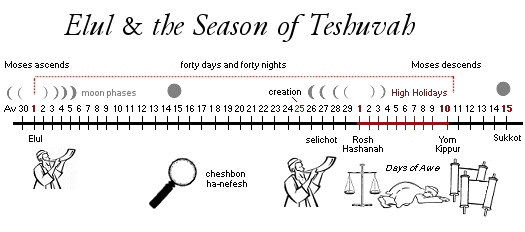 |
This year Sukkot (סֻכּוֹת, "booths" or "tabernacles") begins just after sundown on Wednesday, Sept. 22nd (i.e., Tishri 15 on the Jewish calendar). The festival is celebrated for seven days (i.e., from Tishri 15-21) during which we "dwell" in a sukkah (סֻכָּה, the singular of "sukkot") -- a hut of temporary construction, with a roof covering (schach) of raw vegetable matter (i.e., branches, bamboo, etc.). The sukkah represents our dependence upon God's shelter for our protection and His covering for our providence. We eat meals in the sukkah and recite a special blessing (leshev basukkah) at this time.
Beside the presence of the sukkah, the most prominent symbol of Sukkot is arba'at ha-minim (אַרְבַּעַת הַמִּינִים) - the "Four Species" - or the lulav and etrog. The idea of the lulav/etrog comes from the Torah itself: "On the first day you shall take the product of goodly trees, branches of palm trees, boughs of leafy trees, and willows of the brook, and you shall rejoice before the Eternal your God for seven days" (Lev. 23:40). We wave the "four species" and recite a blessing (netilat lulav) to ask God for a fruitful and blessed year. (Note that the four species are not used on Shabbat -- even when it falls on the first day of Sukkot.)
 |
Hebrew Blessing Card
Z'man Simchatenu - Season of Our Joy
Sukkot marks the conclusion of the Jewish Fall Holidays and is the last of the three Shelosh Regalim (i.e., the three annual pilgrimage festivals: Pesach, Shavuot, and Sukkot (Deut. 16:16). It can be argued that Sukkot is the climax of all the festivals in Scripture: Everything leads to it as a culmination in God's prophetic plan. It is interesting to compare the use of words relating to simchah [joy] in the description of these three festivals. Regarding Pesach, the word simchah does not appear at all (Deut. 17:1-8); regarding Shavuot, it appears only once (Deut. 17:11); but, regarding Sukkot, simchah appears several times:
You shall keep the Feast of Sukkot seven days, when you have gathered in the produce... You shall rejoice in your feast... because the LORD your God will bless you in all your produce and in all the work of your hands, so that you will be altogether joyful. (Deut. 16:13-15)
In fact, in ancient Israel, the joy of Sukkot was so great that it became known simply as "the Feast" (1 Kings 12:32). It was a time of many sacrifices offered for the healing of the nations (Num. 29:12-40), and it was also a time when (on Sabbatical years) the Torah would be read publicly to all the people (Deut. 31:10-13).
From a spiritual perspective, Sukkot corresponds to the joy of knowing your sins were forgiven (during Yom Kippur) and also recalls God's miraculous provision and care after the deliverance from bondage in Egypt (Lev. 23:43). Prophetically, Sukkot anticipates the coming kingdom of the Messiah Yeshua wherein all the nations shall come up to Jerusalem to worship the LORD during the festival (see Zech. 14:16). Today Sukkot is a time to remember God's Sheltering Presence and Provision for us for the start of the New Year.
Note: The Torah Reading Cycle is suspended for the holiday week of Sukkot as well as for Shemini Atzeret (sometimes referred to as the "eighth day" of Sukkot). For a list of the Sukkot Torah readings, please see the Weekly Parashah page.
 |
Sukkot Hebrew Blessing Cards

09.20.10 (Tishri 12, 5771) The Sukkot Blessings page includes some free "Hebrew Study Cards" you can use to prepare for your Sukkot celebrations! The study cards are for the four key blessings customarily recited during this season: the Yom Tov blessing (candle lighting for Sukkot); the Shehechayanu blessing (1st night); the Leshev Basukkah blessing (for dwelling in the sukkah); and the Netilat Lulav (for waving the lulav/etrog). Of course the Hebrew audio is provided on the blessings page. I hope you find the study cards useful, chaverim! Shanah Tovah and Sukkot Sameach!
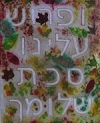
Ufros Alenu Sukkat Shlomekha - "Spread over us Your Sukkah of Peace"
The One Who Calls us Near
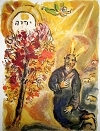
[ I have been suffering lately, chaverim... God knows the reasons. Here are some thoughts I share with you that bring me some measure of comfort, which I hope they might likewise afford you in your hour of need... ]
09.19.10 (Tishri 11, 5771) In this present world (olam hazeh) there are often difficult situations and painful experiences that test even the most resolute faith. Indeed life here is called nisayon - a test. Each of us is under divine examination regarding what we ultimately worship (i.e., regarding that which we will find "worth").
Some things simply cannot be seen apart from the eye of faith in the good. It's been said that "the optimist believes that this is the best of all possible worlds; the pessimist is afraid the optimist is right." But note that both the optimist and the pessimist are believers -- the one keeps hope while the other caves into despair. Pessimism is a dis-ease of the spirit, after all - an abandonment of hope in the good. Faith sees "beauty in ashes" that cannot be apprehended apart from real hope (Rom. 8:24).
The heart of emunah (faith) ultimately affirms: gam zu l'tovah (גַּם זוּ לְטוֹבָה), "this too is for the best" (cp. Rom. 8:28). Emunah "sees what is invisible" (2 Cor. 4:18) and understands (i.e., accepts) that the "present form of this world is passing away" (1 Cor. 7:31). It affirms that underlying the surface appearance of life (chayei sha'ah) is a deeper reality (chayei olam) that is ultimately real and abiding. Emunah therefore understands suffering as part of the greater purposes of God in the world. Everything has a reason, and that includes the seemingly trivial as well as the obviously tragic. The life of emunah calls us to live as toshavim (תוֹשָׁבִים) - sojourners - who are put at a "distance" from the world of appearances. Faith leads to a form of divine "homesickness," a cry of protest over the state of this world and its evils, and a gnawing hunger for love and truth to prevail in the world. By itself, emunah would die of intolerable heartache were it not for the gift of God's comfort. Indeed, the Scriptures describe God as Av Ha-Rachamim (the Father of mercies) and the God of all comfort:
בָּרוּךְ הוּא הָאֱלהִים אֲבִי אֲדנֵינוּ יֵשׁוּעַ הַמָּשִׁיחַ
אֲבִי הָרַחֲמִים וֵאלהֵי כָל־נֶחָמָה
Barukh hu ha'Elohim Avi Adoneinu Yeshua ha'mashiach,
Avi ha'rachamim ve'lohei khol-nechamah
"Blessed be the God and Father of our Lord Yeshua the Mashiach,
the Father of mercies and God of all comfort" (2 Cor. 1:3)
(Download Study Card)
The blessing continues: "who comforts us in all our affliction, so that we may be able to comfort those who are in any affliction, with the comfort with which we ourselves are comforted by God" (2 Cor. 1:4). Note that Paul links our present suffering (πάθος, pathos) with a divinely imparted comfort (παράκλησις, "paraklesis"), which he regards as a state of blessedness. God Himself "calls us to His side" (from παρά + καλέω) in the midst of our afflictions and pain.... The Greek text reads, ὁ παρακαλῶν ἡμᾶς ἐπὶ πάσῃ τῇ θλίψει ἡμῶν, and might be better rendered as, "The one calling to us [to His side] in all our tribulations" (2 Cor. 1:4). God doesn't want us to go through tzuris by ourselves, all alone. He invites us to come to His side for comfort...
The purpose of our afflictions is to learn to let go of what we value in the world in order to attain to a better hope. טוֹב־לִי כִי־עֻנֵּיתִי לְמַעַן אֶלְמַד חֻקֶּיךָ / "It was good for me that I was afflicted, that I might learn your statutes" (Psalm 119:71). God calls out to us in our tribulations so that we may turn away from our illusions and seek refuge in His Presence. Suffering is a tool that only God has the wisdom to use as a means of blessing in our lives. As A.W Tozer once wrote, "It is doubtful whether God can bless a man greatly until He's hurt him deeply," and as Charles Spurgeon likewise affirmed:
Trials make more room for consolation. There is nothing that makes a man have a big heart like a great trial. I always find that little, miserable people, whose hearts are about the size of a grain of mustard-seed, never have had much to try them. I have found that those people who have no sympathy for their fellows -- who never weep for the sorrows of others -- very seldom have had any woes of their own. Great hearts can only be made by great troubles. The spade of trouble digs the reservoir of comfort deeper, and makes more room for consolation. God comes into our heart -- He finds it full -- He begins to break our comforts and to make it empty; then there is more room for grace. The humbler a man lies, the more comfort he will always have. (Spurgeon, Consolation Proportionate to Spiritual Sufferings, 1855).
Note that the heart of emunah is not required to say, gam zu tova - "This is the best," but rather gam zu l'tova - "This, too, is for the best." Having faith that God will one day "wipe away every tear" does not deny the existence of real tears being shed, but it does affirm that real (existential) comfort is coming, and that sadness, pain, and suffering will not be given the last word..... There is an eschatological aspect to suffering for the person of faith. Present suffering will ultimately be redeemed as soul-building, but this does not entail "karma-like" indifference regarding suffering we encounter... If one of us hurts, so does the rest of the body (1 Cor. 12:26). This isn't sanctimonious humbug; there's no "double talk" going on here. The most succinct verse in the New Testament on this subject is but two words: "Jesus wept" (John 11:35). Nonetheless, we can find great comfort by heeding the voice of pain as a diguised message from God. God calls to us in all our tribulations so that we might make our refuge in Him.
May we find His comfort in His Presence now, chaverim.
 |
Rosh Hashanah 5771 Pictures

09.13.10 (Tishri 5, 5771) Happy New Year - Shanah Tovah - chaverim! Here are a few pictures from our Rosh Hashanah celebration last Wednesday evening. Our family sincerely wishes you "shanah tovah u'metukah ba'adoneinu Yeshua ha-Mashiach" - a good and sweet year in our Lord Jesus the Messiah! The great day draws near.... May you walk strong and full of God's love and blessing in this coming year.
Left-to-right (top): 1. The shulchan; 2. Irina lights the candles; 3. Josiah is excited!;
4. Tapuach v'davash plate; 5. John and Josiah
(bottom): 1. Round challah with honey; 2. John and Judah playing ukulele;
3. Yasha blows shofar; 4. Peter blows shofar; 5. Vadim blows shofar
Update: I was planning on taking a few days off this week to get some sorely needed rest, but last night I developed a very high fever with bad body aches. Please offer up a prayer for my healing, chaverim.... Shalom!
Yom Kippur - Friday Sept. 17th

[ Note that the weekly Torah reading is suspended for the Holiday of Yom Kippur, which begins an hour before sundown on Friday, September 17th. ]
09.12.10 (Tishri 4, 5771) The Yom Kippur fast begins an hour before sundown on Friday, September 17th, which is also erev Shabbat this year. It is customary to light the holiday candles, recite Shehecheyanu, and eat a late afternoon meal with loved ones (called Seudat Mafseket, a meal of cessation) an hour or so before the fast begins. The erev Yom Kippur service (i.e., Kol Nidre) begins before sundown and continues into the first part of the Hebrew date of Tishri 10 (i.e., Yom Kippur). The fast lasts for 25 hours, until an hour past sundown on Saturday, September 18th.
It is traditional to wear white clothing as a symbol of purity during Yom Kippur religious services, and some married men wear a kittel, or white robe, as well. Because of the sanctity of the holiday, the tallit is worn for evening services as well. Dressing in this way is intended to make us appear pure, like the angels.
There are three basic synagogue services for Yom Kippur: The erev Yom Kippur service (i.e., Kol Nidre), a morning service the next day (shacharit), followed by an afternoon (minchah) service. The concluding service (called ne'ilah, "locking" [of the gates]) extends the afternoon service until the evening. Most of the day is spent in the synagogue reading from a machzor (prayerbook), asking for forgiveness (selichot) and making confession of sin (viduy). During viduy (וִדּוּי) the custom is to lightly beat the chest for each transgression as it is recited. Yom Kippur comes to an end with the recitation of the Shema and hearing the blast of the "great shofar." The sound of the shofar at the end of the service is called gedolah (great), since it signifies the end of the day and the "sealing of the books" for the coming year. After Yom Kippur ends, it is customary to recite Havdalah over wine before eating anything.
The biblical name for the Day of Atonement is Yom Kippurim (יוֹם הַכִּפֻּרִים), meaning "the day of covering, canceling, pardon, reconciling." Under the Levitical system of worship, the High Priest would sprinkle sacrificial blood upon the Kapporet (כַּפּרֶת) - the covering of the Ark of the Covenant - to effect "propitiation" (כַּפָּרָה) for the previous year's sins. Notice that Yom Kippur was the only time when the High Priest could enter the Holy of Holies and invoke the sacred Name of YHVH (יהוה) to offer blood sacrifice for the sins of the Jewish people. This "life for a life" principle is the foundation of the sacrificial system and marked the great day of intercession made by the High Priest on behalf of Israel.
Yom Ha-Din - Judgment Day
Yom Kippur marks the climax of the Jewish High Holidays and holds tremendous prophetic significance regarding the Second Coming of Mashiach, the restoration of national Israel, and the final judgment of the world. It is also a day that reveals the High-Priestly work of Yeshua as our Kohen Gadol (High Priest) after the order of Malki-Tzedek (Heb. 5:10, 6:20).
According to Jewish tradition, on Rosh Hashanah the destiny of the righteous, the tzaddikim, are written in the Book of Life, and the destiny of the wicked, the resha'im, are written in the Book of Death. Most people, however, won't be inscribed in either book, but are given ten days -- until Yom Kippur -- to repent before sealing their fate. On Yom Kippur, then, everyone's name will be sealed in one of the two books. The ten days between Rosh Hashanah and Yom Kippur are therefore called Aseret Yemei Teshuvah - the "Ten Days of Repentance" - because personal repentance can affect the divine decree for good, though on Yom Kippur each person's judgment is decided.
 |
As Messianic believers, we maintain that Judgment Day has come and justice was served through the sacrificial offering of Yeshua for our sins (2 Cor. 5:21). He is the perfect fulfillment of the Akedah of Isaac. Our names are written in the Lamb's Book of Life, or Sefer HaChayim (Rev. 13:8). We do not believe that we are made acceptable in God's sight by means of our own works of righteousness (Titus 3:5-6), though that does not excuse us from being without such works (as fruit of the Holy Spirit in our lives). The Scriptures clearly warn that on the Day of Judgment to come, anyone's name not found written in the Book of Life will be thrown into the lake of fire (Rev. 20:15). Moreover, all Christians will stand before the Throne of Judgment to give account for their lives (2 Cor. 5:10). "Every man's work shall be made manifest: for the day shall declare it, because it shall be revealed by fire; and the fire shall try every man's work of what sort it is" (1 Cor. 3:13). Life is an examination, a test, and every moment is irrepeatable. Every "careless" word we utter will be echoed on the Day of Judgment (Matt. 12:36-37). Our future day of judgment is being decided today.
The Spring Festivals (Passover, Firstfruits, and Shavuot) have been perfectly fulfilled in the first coming of Yeshua as Mashiach ben Yosef, and the Fall Festivals (Teruah, Yom Kippur, and Sukkot) will be fulfilled in His second coming as Mashiach ben David. Since the first advent fulfilled all of the spring mo'edim to the smallest of details, we believe that His second advent portends similar fulfillment as revealed in the fall mo'edim.
After the summer of harvest (John 4:35), the very first Fall festival on the Jewish calendar is Yom Teruah (Rosh Hashanah), which is a picture of the "catching away" of kallat Mashiach (the Bride of Christ) for the time of Sheva Berachot (seven "days" of blessing that follows the marriage ceremony). Then will come the Great Tribulation and Yom Adonai - the Day of the LORD (יוֹם יְהוָה). Yom Kippur prophetically pictures the "Day of the LORD" or the Day of Judgment in Acharit Ha-Yamim (the End of Days). The heavenly shofar blasts heard at Sinai will be reissued from Zion. First will be the gathering together of those who follow the Mashiach (i.e., those declared tzaddikim because of the merit of Yeshua's sacrifice), and then God's war against Satan and the world system will begin, culminating in the long-awaited coronation of the King of King of Kings - Melech Malchei Ha-Melachim (מֶלֶךְ מַלְכֵי הַמְּלָכִים).
Just as Rosh Hashanah reveals the coming time of Judgment and the rapture of the kehillat Mashiach (church of Christ), Yom Kippur prophetically pictures the Day of the LORD or the Day of Judgment in Acharit HaYamim [last days] for all the nations. After the judgment of the nations during the Great Tribulation, ethnic Israel will be fully restored to the LORD and their sins will be purged (Matt. 24). "All Israel will be saved." Yeshua will then physically return to Israel to establish His glorious millennial kingdom in Zion. Then all the promises given to ethnic Israel through the prophets will finally be fulfilled.
דִּרְשׁוּ יְהוָה בְּהִמָּצְאוֹ קְרָאֻהוּ בִּהְיוֹתוֹ קָרוֹב׃
dir·shu Adonai be·him·matz·o, ke·ra·u·hu bi·yo·to ka·rov
Seek the LORD while he may be found;
call upon him while he is near (Isa. 55:6)
Yom Kippur - Happy or Sad?
In post-Temple Judaism (i.e., rabbinical Judaism) is customary for Jews to wish one another g'mar chatimah tovah (גְּמַר חַתִימָה טוֹבָה), "a good final sealing" during the Ten Days of Awe (i.e., the ten days running from Rosh Hashanah until Yom Kippur). The reason for this is that according to Jewish tradition the "writing of God's verdict" (for your life) occurs on Rosh Hashanah, but the "sealing of the verdict" occurs on Yom Kippur. In other words, God in His Mercy gives us another ten days to do "teshuvah" before sealing our fate.... But it's up to us -- and our teshuvah -- to "save ourselves" from God's decree of death. Our merits (mitzvot) are the key: וּתְשׁוּבָה וּתְפִלָּה וּצְדָקָה מַעֲבִירִין אֶת רעַ הַגְּזֵרָה / "Teshuvah, prayer, and charity deliver us from the evil decree."
Of course as Christians (and Messianic Jews) we have a permanent "sealing" for good by the grace and love of God given to us in Yeshua our Messiah (Eph. 1:13, 4:30; 2 Cor. 1:21-22). The Torah's statement that sacrificial blood was offered upon the altar to make atonement (כַּפָּרָה) for our souls (Lev. 17:11) finds its final application in the "blood work" of Yeshua upon the cross at Moriah (Rom. 5:11). The substitutionary shedding of blood, the "life-for-life" principle, is essential to the true "at-one-ment" with God. The ordinances of the Levitical priesthood were just "types and shadows" of the coming Substance that would give us everlasting atonement with God (Heb. 8-10). Because of Yeshua, we have a Kohen Gadol (High Priest) of the better Covenant, based on better promises (Heb. 8:6). For this reason it is entirely appropriate to celebrate Yom Kippur and give thanks to the LORD for the permanent "chatimah tovah" given to us through the salvation of His Son.
Does the New Testament contradict the Torah in this case? By no means, though we should be careful to define our terms. It must always be remembered that Torah (תּוֹרָה) is a "function word" that expresses our responsibility in light of the covenantal acts of God. The Levitical priesthood expresses the Torah of the Covenant of Sinai (בְּרִית יְשָׁנָה), just as the greater priesthood of Yeshua expresses the Torah of the New Covenant (בְּרִית חֲדָשָׁה). As the author of the Book of Hebrews makes clear: "For when there is a change (μετατιθεμένης) in the priesthood (הַכְּהוּנָּה), there is necessarily (ἀνάγκη) a change (μετάθεσις) in the Torah as well" (Heb. 7:12). The word translated "change" here comes from the verb μετατίθημι (from meta, "after" + tithemi, to "set") which might better be translated as "transposed." The idea is the priesthood reverted back to the original priesthood of Zion and therefore required a corresponding "transfer" of authority (μετάθεσις) to the original kingship as well. Yeshua alone is both High Priest and King...
The priesthood of Yeshua is said to be after the "order of Malki-Tzedek," based on a direct oath from God, that predates the operation of the Levitical priesthood (for more information about the role of Yeshua as our High Priest, see the article "Yom Kippur and the Gospel"). This is not unlike the King/Priest office that Moses held when he commanded the sacrifice of the Passover lambs during the Exodus. The korban pesach (sacrifice of Passover) was not originally instituted through the Levitical priesthood (i.e., the Mishkan), but rather predated the giving of the law to the priests. It is no coincidence that Yeshua explicitly referred to this (pre-Levitical priesthood) event to speak of His role as Seh Elohim, the Lamb of God who takes away the sins of the world (John 3:1-12).
Still, for the Messianic Jewish believer there is a bit of ambivalence about this holiday, perhaps more than any other of the Jewish year. Part of this ambivalence comes from the "already-not-yet" aspect of the New Covenant itself. Already Yeshua has come and offered Himself up as kapparah (atonement/propitiation) for our sins; already He has sent the Ruach Hakodesh (Holy Spirit) to write truth upon our hearts; already He is our God and we are His people. However, the New Covenant is not yet ultimately fulfilled since we await the return of Yeshua to restore Israel and establish His kingdom upon the earth... Since prophetically speaking Yom Kippur signifies ethic Israel's atonement secured through Yeshua's sacrificial avodah as Israel's true High Priest and King, there is still a sense of longing and affliction connected to this holiday that will not be removed until finally "all Israel is saved." So, on the one hand we celebrate Yom Kippur because it acknowledges Yeshua as our High Priest of the New Covenant, but on the other hand, we "have great sorrow and unceasing anguish in our hearts" for the redemption of the Jewish people and the atonement of their sins (Rom. 9:1-5; 10:1-4; 11:1-2, 11-15, 25-27). In the meantime, we are in a period of "mysterious grace" (yemot ha-mashiach) wherein we have opportunity to offer the terms of the New Covenant to people of every nation, tribe and tongue. After the "fullness of the Gentiles" is come in, however, God will turn His full attention to fulfilling His promises given to ethnic Israel. That time is coming soon, chaverim...
 |
Prayer Request....

09.9.10 (Tishri 1, 5771) Shalom chaverim. I really need your prayers for my health at this time. I am feeling very weak and my chronic pain issues are sapping me of much strength. My eyes also have been bothering me for the last two weeks. Please, if you wouldn't mind asking the LORD for special healing, I would deeply appreciate it.
Shanah Tovah to you all!
To a Good and Sweet Year in Yeshua!

09.18.10 (Elul 29, 5770) We are getting ready for our Rosh Hashanah seder this evening, chaverim. When we taste of the apples and honey, we will all recite:
יְהִי רָצוֹן מִלְּפָנֶיךָ יהוה אֱלהֵינוּ וֵאלהֵי אֲבוֹתֵינוּ
שֶׁתְּחַדֵּשׁ עָלֵינוּ שָׁנָה טוֹבָה וּמְתוּקָה בַּאֲדנֵינוּ יֵשׁוּעַ הַמָּשִׁיחַ
ye·hi ra·tzon mil·fa·ne·kha, Adonai E·lo·hei·nu ve·lo·hei a·vo·tei·nu,
she·te·cha·desh a·lei·nu sha·nah to·vah u·me·tu·kah ba·A·do·nei·nu Ye·shu·a ha·Ma·shi·ach
May it be your will, LORD our God and God of our fathers,
that you renew for us a good and sweet year in our Lord Yeshua the Messiah!
Yeshua our Messiah is the one who renews and sweetens our lives with His goodness and love, after all. Rosh Hashanah -- like all the moedim (appointed times) -- centers on Him... He is the One who gives the teruah, the "shout of victory" for our salvation, and He will soon sound the heavenly shofar to call us before His glorious presence. It is our prayer that we all grow closer to Him during this coming year, chaverim. Amen.
To all our suporters: Please know we LOVE and appreciate you so much! THANK YOU for standing with this ministry this past year. We could not be here without you!
Personal Update: After all the writing I've done recently, I am quite exhausted and need a few days of "downtime" to regain my strength. I have been feverish and very tired the last week or so. Please offer up a prayer for my healing, chaverim.... Thank you so much.
High Holidays and the Gospel

[ The following entry provides some thoughts about the Jewish High Holidays in light of the gospel of Jesus. I hope you find this encouraging as you put your trust in Him.... ]
09.08.10 (Elul 29, 5770) Everything starts with the foundational truth that Almighty God is our personal Creator (הַבּוֹרֵא). This is the first principle of all rational thinking: "In the beginning (בְּרֵאשִׁית), God created the heavens and the earth" (Gen. 1:1). Notice that the word "beginning" (i.e., bereshit) is based on the term rosh (ראשׁ, "head"), and therefore points to "the head of (all things)," namely God (אֱלהִים). God must be the starting point of all our thinking about life.
בְּרֵאשִׁית בָּרָא אֱלהִים אֵת הַשָּׁמַיִם וְאֵת הָאָרֶץ
be·rei·shit ba·ra E·lo·him et ha·sha·ma·yim ve·at ha·a·retz
"In the beginning, God created the heavens and the earth" (Gen. 1:1)
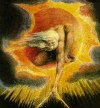
Study Card
The Torah relates that God began creating the heavens and the earth in the darkness of the primordial yom rishon (יום ראשון, again derived from ראשׁ), the "first day," (conventionally called "Sunday" in our modern calendars). "The earth was without form and void (תהוּ וָבהוּ) and darkness was over the face of the deep, and the Spirit of God (רוּחַ אֱלהִים) was brooding over the face of the waters, and God said, 'Let there be light' (Gen 1:2-3). Notice that the triune nature of the Godhead is revealed in the first verses of the Torah: the Divine Voice cannot be separated from God, no more than the Spirit of God can be so separated.
The Biblical day (יוֹם) begins in the evening: "and there was evening and there was morning, the first day." This pattern, vayhi erev, vayhi voker (וַיְהִי־עֶרֶב וַיְהִי־בקֶר), "and there was evening and there was morning," recurs for each of the six days of creation, including the sixth day, when God created man (Adam and Eve). Therefore the work of creation ("ma'aseh bereshit") was completed by the end of the sixth day (i.e., Friday in our modern calendars).
When Adam first opened his eyes and human consciousness was born, he immediately understood that the LORD created all things, including himself. According to midrash, Adam's first words were, יהוה מֶלֶךְ עוֹלָם וָעֶד / Adonai malakh olam va'ed: "The LORD is King for ever and ever." God then said, "Now the whole world will know that I am King," and He was very pleased. This was the "tov me'od" (טוֹב מְאד) moment of creation, when God saw all that He had made "and found it very good" (Gen. 1:31). The birthday of humanity is therefore the Coronation Day for the King of the Universe. According to Jewish tradition, this date represents Rosh Hashanah, or the "head of the year" for humanity, when God began to rule as King over the universe He created.

The implication that God is our Creator is enormous and pervades everything else in our lives. God's creative power is witnessed by all conscious life. The Divine Light that was created before the sun and the stars represents God's immanent presence that "lights up" all of creation - including our minds (Gen. 1:3). Since we were created b'tzelem Elohim, "in the image of God," the witness of God's truth is foundational to all of our thinking as well. The revelation (not the invention) of logical first principles is part of God's "signature," if you will, of how the mind is wired to reality. Likewise we have intuitive awareness regarding the existence of moral truth (i.e., the standard of justice and moral law), aesthetic truth (i.e., ideals of beauty, goodness, worth, and love), and metaphysical truth (i.e., cause and effect relationships). "The heavens are recounting the glory of God, and the expanse is proclaiming his handiwork" (Psalm 19:1). God's power and presence can be clearly inferred from the tremendous effect of the universe itself. As Paul stated, "the invisible things of Him (τά ἀόρατα αὐτοῦ) from the creation of the world are clearly seen (καθοράω), so that people are without excuse" (Rom. 1:19-20). It is the fear of the LORD (יִרְאַת יהוה) that is truly the beginning of wisdom and knowledge (Psalm 111:10; Prov. 1:7; 9:10). The Hebrew word for fearing (ירא) and seeing (ראה) share the same root. We cannot truly see reality apart from reverencing God as the Lord and King of Creation.
It is important to emphasize that God is not some impersonal "First Cause" or "Unmoved Mover" of the universe. He is not some "cosmic big bang" that started the universe only to be indifferent to its functioning. No, God is a morally perfect being who created everything "very good" and who actively engages and sustains His creation. God is a personal Creator and Ruler of all that exists. In theological jargon, God is both "immanent" (sustaining and upholding creation) and "transcendent" (exalted over creation). This God has a Name (YHVH), a mind, and a moral, purposive will that imbues all of creation. God is LORD over all time and space, the King of Glory, who is Master of all possible worlds. He is therefore intimately concerned with the rule of His law, expressed both in the "natural" world (i.e., the laws of physics, chemistry, etc.), the mental world (i.e., the laws of logic, mathematics, etc.), the ethical world (i.e., the laws of morality, ethics, etc.), and the spiritual world (the laws of spirit and of spiritual beings).

When God revealed to Moses the meaning of the Name "LORD" (i.e., YHVH: יהוה), he was given the revelation of Shelosh Esrei Middot - the 13 attributes of God's Mercy (Exod. 34:6-7). The LORD described Himself as a God who is merciful and gracious, slow to anger, and abounding in love (chesed) and truth (emet), who guards love and carries (נָשָׂא) iniquity (עָוֹן), transgression (פֶּשַׁע), and sin (חֵטְא), but who will not clear the guilty... In other words, because the LORD is holy and righteous, he cannot leave the guilty unpunished. This follows from the fact that God cannot lie (Num. 23:19; Titus 1:2). Since God necessarily must be true to His nature, he cannot negate the truth or violate justice. The LORD cannot sweep sin "under the rug" or pretend that it is not there.
Notice that the love of God does not negate His righteousness and justice. The LORD can never overlook His rule as our Creator and His moral will as our Judge:
כִּי־צַדִּיק יְהוָה צְדָקוֹת אָהֵב יָשָׁר יֶחֱזוּ פָנֵימוֹ
ki tzad·dik Adonai tze·da·kot a·hev, ya·shar ye·che·zu fa·ney·mu
"For the LORD is righteous; he loves righteous deeds;
the upright shall behold his face" (Psalm 11:7)
Indeed, the very "foundation" or "habitation" (i.e., machon: מָכוֹן) of God's throne is righteousness and justice:
צֶדֶק וּמִשְׁפָּט מְכוֹן כִּסְאֶךָ
חֶסֶד וֶאֱמֶת יְקַדְּמוּ פָנֶיךָ
tze·dek u·mish·pat me·chon kis·e·kha,
che·sed ve·e·met ye·kar·de·mu fa·ney·kha
"Righteousness and justice are the foundation of your throne;
steadfast love and truth go before you" (Psalm 89:14)
While it is true that God is love, it is also true that He is righteousness and justice, and these attributes of His nature cannot be divided or separated. Righteousness and justice are the foundation of His throne (i.e., the symbol of His Kingship). The King of the Universe commands those created in His image and likeness to observe His will (i.e., moral law), and sin is expressly defined as "lawlessness" (ἡ ἁμαρτία ἐστὶν ἡ ἀνομία), understood to mean the repudiation of God's authority to rule (1 John 3:4). Sin is therefore essentially a form of high treason against God's Kingship and authority, and the demand to be autonomous ("self governing") is the attempt to take the crown from God Himself.
All human beings are sinners who share in the "fallenness" of the Adam ha-rishon (Rom. 3:23; 5:12). We do not just commit sins, as if they were "accidental" to our nature, but we are sinners in the sense that sin is part of our "heart" or core personality structure (Eph. 2:3; Matt. 15:19). This is because "the mind (τὸ φρόνημα) that is set on the flesh is hostile (ἔχθρα) to God, for it does not submit to God's law; indeed, it cannot" (Rom. 8:7).
Since God is perfectly righteous, sin must be judged for what it really is: treason against His loving and righteous will. Both the human conscience and the revealed will of God (i.e., the moral law contained in the Torah of Moses) clearly indict all mankind of treason before the tribunal of a Holy and Righteous God. Indeed, every mouth will be stopped before the bar of the Holy One's judgment (Rom. 3:19).
The Scriptures plainly teach that the penalty for sin is death (Gen. 2:16-17; Rom. 6:23; Isa. 59:2, Ezek. 18:4). Physical death is a symptom of the deeper and more serious problem of eternal, or spiritual, death. Just as physical death represents the separation of the soul from the body, so spiritual (or eternal) death represents the separation of the soul from the Presence of God. Spiritual death is pictured as hell, a place of eternal suffering and horror (Mark 9:43; Rev. 20:10). Hell is described using various frightful metaphors in Scripture. It is said to be a fiery pit (Matt. 18:8-9), an eternal fire (Matt. 25:41, Jude 7), a lake of fire (Rev. 20:15), a place of "outer darkness with weeping and gnashing of teeth" (Matt. 8:12; 13:50; Rev. 21:8), and a place of eternal punishment (Matt. 25:46). These are horrific images of warning intended to shock us out of our spiritual stupor.... Flee from the wrath to come!
The "bad news" about the death sentence caused by our sin is not the end of the story, thank God... Even at the very beginning, after Adam and Eve had sinned, the "good news" of God's redemption was first mentioned (i.e., the "proto-euangelion" of Gen. 3:15). After pronouncing judgment and exiling Adam and Eve from the original paradise, the LORD prophesied that a cosmic struggle for the fate of humanity would ensue. Through his machinations, Satan (represented by the nachash, or serpent) had arrogated a legal or forensic "right" to humanity, who were now under God's judicial kelalah (curse). However, the LORD foretold that the curse would be rescinded by means of the Seed (הַזֶּרַע) - the Mashiach - who would "crush the head" of the serpent and ransom those who were sold to sin. There is good news behind the bad news, then, just as Yeshua is described as the Lamb slain from the foundation of the world (1 Pet. 1:20, Eph. 1:4, Rev. 13:8, 17:8). The grand narrative of the Scriptures then serves as God's loving response to the "bad news" of mankind's sin.
The promise of the Kingdom of God (מַלְכוּת הָאֱלהִים) made manifest upon the earth has long been the hope of the Jewish people. The prophets had long foretold a coming day of redemption for Israel when Zion would be made the praise of all the earth. Zion therefore represents the restoration of paradise lost, and summarizes Jewish philosophy of history. The concept of the King Messiah, the "Anointed One" who would one day come to deliver his people from oppression at the beginning of an era of world peace has been the sustaining hope of the Jewish people for generations. King Messiah is the instrument by whom God's kingdom will be established in Israel and in the world.
When Yeshua came preaching the "good news of the Kingdom," his message was not readily received by the Jewish leadership. After all, they were expecting a political Messiah who would deliver Israel from oppression and establish universal peace. Yeshua, however, taught that the Kingdom of God was "not of this world" (Luke 17:21; John 18:36) and therefore focused on redeeming citizens who would be enabled to enter it. In other words, the first order of business was to redeem a kingdom people to inherit the kingdom, but that required a solution to the problem of sin (Col. 1:12).
Hence Yeshua came as the "Lamb of God" (שֵׂה הָאֱלהִים) who would fulfill the imagery given in the Akedah of Isaac, the blood of the "pass over" lamb, and indeed all of the sacrifices defined in the Torah. The "korban principle" of "life-for-life," the innocent sacrificed for the guilty, implied the idea of "penal substitution" for the trusting sinner. The guilty person would lean his hands upon the head of the animal (semichah) and then confess: "I deserve to die instead of this innocent animal, but the LORD mercifully accepts the death of this innocent one in my stead." The worshipper would understand that were it not for chasdei Adonai (חֲסְדֵי יהוה) - the sacrificial love of the LORD - the victim's fate should have been his own. When the LORD saw the shed blood and ascending smoke of the sacrifice, He forgave the sinner based on his faith and teshuvah (repentance). The entire sacrificial system - which constitutes over 40% of all the commandments given in the Torah - was therefore predicated on the idea of substitutionary atonement given on behalf of the repentant sinner. Without blood atonement, there is simply no sense to the elaborate sacrificial system given in the Torah. The life of the flesh is in the blood -- given to make "atonement" upon the altar (Lev. 17:11). The entire system was set up to "point to" the coming sacrifice of the Messiah Himself of whom the prophets foretold (Isa. 53, Psalm 22, Zech. 12:10, etc.).
The Jews wanted King Messiah to vanquish the enemies of Israel, but Yeshua presented Himself as the Suffering Servant whose death would redeem us from the debt incurred through our sin (Gal. 3:13-14; 2 Cor. 5:21). By so doing, Yeshua made it possible for God to forgive us and to impart to us the inheritance of the Kingdom of God (Col. 1:12). The shared suffering of the Heavenly Father and Yeshua was the means by which "justice and peace have kissed," thereby restoring the children of promise to their original inheritance:
חֶסֶד־וֶאֱמֶת נִפְגָּשׁוּ צֶדֶק וְשָׁלוֹם נָשָׁקוּ
che·sed ve·e·met nif·ga·shu, tzedek ve·sha·lom na·sha·ku
"Love and truth have met, justice and peace have kissed" (Psalm 85:10)
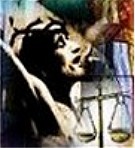
Download Blessing Card
Yeshua's first words of public ministry were "Repent and believe the gospel" (Mark 1:15). The word "repent" is metanao (μετανοέω), meaning "change your thinking," and the word "gospel" means "good news" (i.e., εὐαγγέλιον, from , εὖ- "good," and ἄγγελος, "message"). We could translate the verse as: "Change your thinking and believe the message of God's good will toward you." When the Apostle Paul later testified of his dramatic conversion experience on the Road to Damascus, the resurrected Messiah commissioned him to go to the Gentiles in order to "open their eyes, so that they may turn (ἐπιστρέφω) from darkness to light and from the power (i.e., authority, ἐξουσία) of Satan to the power of God, that they may receive forgiveness of sins and a place among those who are sanctified by faith in me" (Acts 26:18).
Humanity's greatest need is to be loved and accepted by God, but this requires a solution to the problem of sin. A "good judgment" from heaven, however, cannot be obtained through self-justification or through "works of righteousness which we have done" (Titus 3:5). The "books" are opened in heaven with a detailed record of all our sinful acts (Rev. 20:12). The violation of God's law requires atonement. Yeshua is God's exclusively appointed Sin Bearer, and only by means of trusting in his sacrificial death on the cross are we are declared not guilty (or "justified") by faith. Only God can justify the ungodly (Rom. 4:5) and "clothes" us with His own righteousness (see Zech. 3:1-5). Salvation is of the Lord. In the end, the only righteousness that really matters is the righteousness of God... We must renounce all hope of other approaches or defenses. None of us is righteous, "no, not one" (Psalm 14:2-3; Rom. 3:10). All our righteousness is as "filthy rags" before the throne of Heaven: "We have all become like one who is unclean, and all our righteous deeds are like a polluted garment. We all fade like a leaf, and our iniquities, like the wind, take us away" (Isa. 64:6).
The righteousness of Yeshua is the gospel message itself, that is, the power of God to save us from the verdict of our sinful condition (eternal death) and to restore our relationship with a holy and morally perfect God (eternal life). God will not clear the guilty, but He does something infinitely better: He removes the guilt! The curse of the Law's verdict upon us has been taken away through the substitutionary sacrifice of Yeshua upon the cross at Moriah (Gal. 3:10-13; James 2:10; 2 Cor. 5:21). The sting of death is sin, and the power of sin is the law (ἡ δύναμις τῆς ἁμαρτίας ὁ νόμος), but God gives us the victory (νῖκος) by imputing our sin to Yeshua and ascribing His righteousness to us in exchange (1 Cor. 15:56-58; 2 Cor. 5:21). By sincerely turning to Him in confession of our condition and trusting in His righteousness we are declared legally "justified" (i.e., "just-if-I'd" never sinned) before the Judge of the World. Moreover, through our union with Yeshua, we share in the vindication of His resurrected life and have peace with God (Rom. 5:1). To be justified is to share in Yeshua's righteousness: Adonai Tzidkenu!
Jim Eliot once said, "He is no fool who gives what he cannot keep to gain what he cannot lose." Repentance means changing your mind by turning to God. When we turn toward God's embrace, we necessarily turn away from selfishness and sin. Truly surrendering to God's rule as your King means that you will perform "deeds in keeping with repentance" (Acts 26:20). You will begin to live as a citizen of the Kingdom of God - even though you still suffer as a "stranger and pilgrim" in this world (Col. 1:13; 1 Pet. 1:5; Heb. 11:13). One day soon the Messiah will return to establish His reign in Zion (Isa. 11:9). Ultimately God will create a new world for His redeemed people, free from the ravages of sin and death (Isa. 65:17-19).
Abraham Heschel once wrote, "God is of no importance unless he is of supreme importance," and while that is undoubtedly true, what is of supreme importance to God is the salvation of the lost sinner (John 3:16; Luke 19:10; 2 Pet. 3:9). But God has entrusted you and me to help others come into the Kingdom. He wants us to help bring in the great harvest (John 4:35)! God could use angels to issue the call to "repent and believe" the gospel, or He could put great signs in the heavens, but in His infinite wisdom He has chosen to use the "foolishness" of proclaiming the truth of the cross of Yeshua to save those who are lost. But note that the cross is the central focus. As Paul wrote, "For I decided to know nothing among you except Yeshua the Messiah and him crucified (1 Cor. 2:2). This is of first importance to God (1 Cor. 15:3). The sacrificial death of Yeshua is a scandal to the proud, but it is the method God uses to save people from eternal death (1 Cor. 1:22-23). There is NO GOSPEL MESSAGE apart from offense - first, the offense of the ego's deflation (i.e., being convicted as a rebel deserving of Hell), and second, the offense of the Cross (i.e., that no human merit can effect the salvation given through Yeshua ALONE). The offense of the gospel is the proclamation that there is no other way to heaven than through the Cross of Yeshua, and there is no other Name than the Name of Yeshua for the salvation of human beings (John 14:6; Acts 4:12; 1 Cor. 1:23; 1 John 2:23).
Our great duty as followers of Yeshua is to make much of His salvation... The Ruach HaKodesh always glorifies our Messiah, the Son of Man (John 16:13-14). But as Paul asked, "How then will they call on him in whom they have not believed? And how are they to believe in him of whom they have never heard? And how are they to hear without someone preaching (i.e., κηρύσσω, "publishing, or "proclaiming openly") the message (Rom. 10:14)? Likewise Yeshua commanded his followers to "go and make disciples (i.e., talmidim: students) from among all the nations, immersing them into the reality of the Father, the Son and the Ruach HaKodesh, teaching them to obey all that I have commanded you" (Matt. 28:18-19). The proclamation of the gospel is one of your greatest responsibilities as a follower of the Lord.
Yeshua is the "propitiation" or "expiation" for our sins. The Greek word used in Romans 3:25, 1 John 2:2, and 1 John 4:10 (i.e., ἱλαστήριος) is the same word used in the LXX for the kapporet [cover of the ark of the covenant] in the Holy of Holies which was sprinkled with the blood of the sacrifice on Yom Kippur. "For by one offering he hath perfected for ever them that are sanctified" (Heb. 10:14). Those who are trusting in Yeshua as their Atonement before the Father are thereby declared tzaddikim and their names are written - and sealed - in the Book of Life.
The Day of Judgment for our sinful lives has come in the Person of Yeshua the Mashiach, blessed be He. All those who truly belong to Him are written in the "Lamb's book of life," or Sefer HaChayim (Phil. 4:3; Rev. 3:5; 13:8; 17:8; 20:12, 15; 21:27; 22:19).
 |
Addendum: Yeshua is the Creator
During Rosh Hashanah we remember that God is our Creator and Judge, and both of these attributes refer to Yeshua our Savior. The New Testament identifies the Voice of the Creator as the all-powerful Word of God: בְּרֵאשִׁית הָיָה הַדָּבָר / "in the beginning was the Word" (John 1:1,14). Yeshua is the Source of all life in the universe: כָּל־הַמַּעֲשִׂים נִהְיוּ עַל־יָדוֹ / "All things were made by Him (John 1:3). The "Word made flesh" is the "image of the invisible God" and the "radiance of the glory of God and the exact imprint (χαρακτήρ, 'character') of his nature" (John 1:14, Col. 1:15). All of creation is being constantly upheld by the word of His power (Heb. 1:3): "All things were created by Him (i.e., Yeshua), and for Him" and in Him all things consist (συνεστηκεν, lit. "stick together") (Col. 1:16-17). Creation begins and ends with the redemptive love of God as manifested in the Person of Yeshua our Mashiach... He is the Center of Creation - it's beginning and end. As it is written: אָנכִי אָלֶף וְתָו רִאשׁוֹן וְאַחֲרוֹן ראשׁ וָסוֹף / "I am the 'Aleph' and the 'Tav,' the First and the Last, the Beginning and the End" (Rev. 22:13). Indeed, Yeshua is מֶלֶךְ מַלְכֵי הַמְּלָכִים / Melech Malchei Hamelachim: The "King of kings of kings." He is LORD of all possible worlds -- from the highest celestial glory to the dust of death upon a cross... יְהִי שֵׁם יהוה מְברָךְ / yehi shem Adonai mevorakh: "Let the Name of the LORD be blessed" forever and ever (Psalm 113:2).
 |
New Rosh Hashanah Seder Guide

[ Though there are technically four "New Year Days" on the Jewish calendar, two are most widely recognized: the New Year of spring (i.e., Nisan 1 and the time of Passover) and the new year of fall (i.e., Tishri 1, the time of the High Holidays). The new year of spring is based on the Biblical calendar and marks appointed times and the dates of kings, whereas the new year of fall is used for the Torah reading cycle and for the Jewish civil year. ]
09.06.10 (Elul 26, 5770) Did you know that some people actually have two seders during the year: one in the spring (i.e., the Passover seder), and the other in the fall for Rosh Hashanah? The Rosh Hashanah seder begins at least 18 minutes before sundown, just before the start of Tishri 1 (this year, Wednesday the 8th). The main event consists of a special simcha (festive) meal, somewhat similar to a Friday evening Shabbat meal, with the addition of some special food, blessings, and listening to the shofar blast. The celebration begins with the lighting of candles (symbolizing the transition from profane to sacred time) and the special blessing thanking God for enabling us to reach this season (i.e., Shehecheyanu).

After starting the celebration, ritual "appetizers" called simanim (סִימָנִים) are often served. These are symbolic foods used as an occasion to offer first blessings for the New Year. We eat round challah to remind us that life is a circle (a cycle of seasons) and also to remind us of the Kingship (Crown) of God; we taste apples dipped in honey as a token of our wish for a sweet year, and so on. We also eat some specialized foods just for Rosh Hashanah. For example, we eat leeks, called karsi in Aramaic, as a play on the Hebrew word karat - to cut down - i.e., "may our enemies be cut down." We also eat pomegranates to remind us of the sweetness of the Torah and to remember God's commandments, and so on. Doing all this adds fun to the occasion and helps us sanctify the main meal. After finishing dinner, we are ready for the climatic event of the evening: the sounding of the shofar!
To make it easier for you to participate, I have created an "Easy Rosh Hashanah Seder Guide" that includes step-by-step procedures for holding your own Rosh Hashanah home celebration. The new Seder includes English transliterations along with the Hebrew blessings, so now everyone can join in! Celebrating Rosh Hashanah is both joyous and spiritually significant, especially from a prophetic perspective. You can download the free Seder Guide here. I hope you find this helpful, chaverim.

 |
Apple Picking for Rosh Hashanah
09.06.10 (Elul 26, 5770) Here are a few pictures we took for our annual apple picking event before Rosh Hashanah. The weather was nice but the mosquitoes were really swarming us in the orchard:
Left-to-right (top): 1. Judah eats an apple; 2. John holding Judah; 3. An apple tree branch;
4. Judah before the trip; 5. At the orchard.
(bottom): 1. Josiah eats an apple; 2. Judah picks an apple; 3. in the midst of the orchard;
4. MB picking some Haralson apples; 4. Judah reaches for an apple.
May the new year be good and sweet for us all, and may our righteous deeds increase, like the many seeds of the pomegranate (1 John 2:29). B'shem Yeshua Adoneinu: Amen.
Shabbat Shuvah - שבת שובה

[ The following entry concerns this week's Torah reading, parashat Ha'azinu. Please read the Torah portion to "find your place" here. ]
09.06.10 (Elul 26, 5770) The Sabbath between Rosh Hashanah and Yom Kippur is called Shabbat Shuvah - "The Sabbath of Return." It is called "shuvah" because the Haftarah portion begins, Shuvah Yisrael ad Adonai Elohekha (שׁוּבָה יִשְׂרָאֵל עַד יְהוָה אֱלהֶיךָ): "Return, O Israel, unto the LORD your God!"
שׁוּבָה יִשְׂרָאֵל עַד יהוה אֱלהֶיךָ כִּי כָשַׁלְתָּ בַּעֲוֹנֶךָ׃
shu·vah Yis·ra·el ad Adonai E·lo·hey·kha, ki kha·shal·ta ba·a·vo·ne·kha
"Return, O Israel, to the LORD your God,
for you have stumbled because of your iniquity" (Hos. 14:2[h])
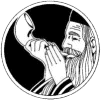
Download Study Card
The portion continues: "Take with you words (devarim) and return (shuv) to the LORD; say to him, 'Take away all iniquity; accept what is good, and we will pay with bulls the vows of our lips'" (Hos. 14:3). Note that Rabbinical Judaism has long used this verse to deny the need for blood atonement for sin, though this idea is alien to the preponderance of the Torah's clear teaching on the subject (for more on this, see this article).
Since this Sabbath occurs before Yom Kippur, it is customary to listen to a sermon from an honored Torah sage calling for teshuvah (repentance) at this time. "Seek the LORD while he may be found; call upon him while he is near. Let the wicked forsake his way, and the unrighteous man his thoughts; let him return to the LORD, that he may have compassion on him, and to our God, for he will abundantly pardon" (Isa. 55:6-7).
דִּרְשׁוּ יְהוָה בְּהִמָּצְאוֹ קְרָאֻהוּ בִּהְיוֹתוֹ קָרוֹב׃
dir·shu Adonai be·him·matz·o, ke·ra·u·hu bi·yo·to ka·rov
Seek the LORD while he may be found;
call upon him while he is near (Isa. 55:6)

Download Study Card
Note: The haftarah portion for Shabbat Shuvah is composed of selections from two books of Prophets: Hosea, and either Joel or Micah (depending on Ashkenazic or Sephardic custom). Ashkenaz read Hosea 14:2-10 and Joel 2:15-27; Sephardim read Hosea 14:2-10 and Micah 7:18-20. Other than the special haftarah, the service on this Shabbat is not any different from a regular Shabbat.
Personal Update: I have been feeling quite ill for the last week or so, chaverim. Our car is also over heating and in need of repair. Oy... Please keep this ministry in your prayers. Thank you.
Divine Absence and Teshuvah
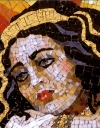
[ The following is intended to help us get ready for Rosh Hashanah (or Yom Teruah), which begins Wednesday, Sept. 8th at sundown... ]
09.06.10 (Elul 26, 5770) The phrase hester panim (הֶסְתֵר פָּנִים) means "hiding of the face." It is often used when discussing the Book of Esther, where God's Name isn't mentioned even once, yet the hidden Presence is realized in the outcome of the story. In this sense of the term, hester panim is somewhat like the sun on an overcast day: Just because you don't see it doesn't mean it isn't there. God's providential care for us is at work at all times, whether we perceive it or not.
On the last day of Moses' life, the LORD said to him, "Behold, you are about to lie down with your fathers. This people will rise and whore after the foreign gods among them in the land that they are entering, and they will forsake me and break my covenant that I have made with them" (Deut. 31:16). The LORD continues: "Then my anger will be kindled against them in that day, and I will forsake them and hide my face from them, and they will be devoured.... And I will surely hide my face in that day because of all the evil that they have done, because they have turned to other gods" (Deut. 31:17-18).
Unlike the happy thought that hester panim refers to God's hidden providence for good, in this case hester panim refers to the terrifying prospect of the withdrawal of the Divine Presence itself. God "hides His face" from us because our own desire for evil blinds us to the truth of His Presence. Hester panim therefore is not only "absence of Divine Presence," but "presence of Divine Absence." In other words, sin and selfishness causes the Divine Presence to remove from us, but that is precisely because we remove ourselves from Him. "I will hide... because you have turned..." The distance is therefore reciprocal: Selfishness turns God away from us and turns us away from God.
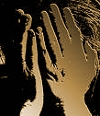
In difficult moments, many people cynically ask, "Where's God?" and yet they have no intention of turning from sin to seek the Divine Presence. They are quick to judge the Divine Absence as an excuse for the return to selfishness. This "hardening of the heart" leads to ever-increasing spiritual darkness and confusion... Finally the line is crossed and they become unable to turn away, unable not to sin (non posse non peccare). They are consigned to a frightful state: "God gave them up to a debased mind (αδοκιμον νουν) to do what ought not to be done" (Rom. 1:28).
People tend to blame God for the Divine Absence yet forget that God "hides His face" from those who elevate selfish desire over all other things... "Whoring after other gods" is nothing more than perverse self-exaltation, stubborn self-worship, and the incessant return to yourself as the object of ultimate concern in life.... This profound despair form is truly the "sickness unto death."
These are not happy thoughts, chaverim. In some tragic cases, the disease "reaches term" and the person actually dies. The "hiding of face" is then forever sealed. Since we have hidden our face from Him, God has hidden His face from us. God forbid that this should be anyone's ultimate spiritual destiny....
Is there a redemptive side to all of this? In some cases God "turns away" from us in order to afflict us and understand our need to return to Him: "It was good for me that I was afflicted, that I might learn Your statues" (Psalm 119:71). The sense of "Divine Absence" can be a gift that helps us seek the Divine Presence: "Draw near to God, and he will draw near to you" (James 4:8). The "dark night of the soul" can be a means of leading us to godly sorrow that leads to life (2 Cor. 7:10).
In keeping with the Days of Awe and the call to do teshuvah shelmah (a complete repentance), then, let me quote from the prophet Isaiah:
"Seek the LORD while he may be found; call upon him while he is near; let the wicked forsake his way, and the unrighteous man his thoughts; let him return to the LORD, that he may have compassion on him, and to our God, for he will abundantly pardon" (Isa. 55:6-7).
Let us "wait for the LORD, who is hiding his face from the house of Jacob, and hope in him" (Isa. 8:17). Wishing you teshuvah shlemah b'ahavat Yeshua - "A complete turning in the love of Jesus."
Your Own Day of Judgment

[ I have been feverish the last two days, but I managed to write the following entry related to Rosh Hashanah. I hope you find it helpful... ]
09.03.10 (Elul 24, 5770) The central theme of Rosh Hashanah is to recall that God is our Creator, our King, and therefore our righteous Judge. Since our souls were created by God, we have the duty to serve Him as our King and live before Him as our Judge. Since the LORD is the God of Truth (יהוה אֵל אֱמֶת) who cannot attest to a lie, every person who has ever lived will necessarily face judgment one day (Heb. 9:27).
There is a midrash about a dialog between Adam and God after Adam's banishment from the Garden of Eden. Adam feared that all humans would later blame him for their mortality, but God replied, "Don't worry about the others. From now on, each soul will be responsible for giving account of his or her life. Each person is required to write his or her own 'Book of Life.' On the Day of Judgment, I simply ratify what has been written."
Indeed, the Scriptures reveal that there are heavenly "books" that contain detailed records of all that we did (or did not do) during our time here on earth: "And I saw the dead, great and small, standing before the throne, and books were opened. Then another book was opened, which is the Book of Life (סֵפֶר הַחַיִּים). And the dead were judged by what was written in the books, according to what they had done" (Rev. 20:12).
 |
Today you are writing the "Book of your Life." Every action you make - every thought, every decision, every deed - is being "recorded" in the archives of Heaven itself. When your soul returns to account for itself before God one day, this "book" will be opened before the Judge of the Universe. As Yeshua said, "on the Day of Judgment (יוֹם הַדִּין) people will give account (ἀποδίδωμι, lit. "give back") every idle word they speak (Matt 12:36). The story of your life will be replayed before all of heaven itself...
There are actually several different judgments described in the Scriptures. For instance, there is: 1) the judgment of believers, sometimes called the "judgment seat of Christ" (2 Cor. 5:10; Rom. 14:10); 2) the "sheep and goats" judgment at the end of the Great Tribulation period (Matt. 25:31-36), and 3) the "Great White Throne" judgment at the end of the Millennial Kingdom period (Rev. 20:11-15). Common to each of these judgments is the inevitability that all men, both living and dead, saved and unsaved, will ultimately give an account of their lives before Yeshua as the true Judge (John 5:22,27; Rom. 14:11-12; Phil. 2:10-11, cp. Isa. 45:22-23).
 |
Some Christians tend to think that they will not face judgment for their lives here on earth because they are "saved." And while it is gloriously true that Christians will not face condemnation with the world, nonetheless each follower of Yeshua will be required to give account for how he "walked out" his salvation in this world. "For we must all appear before the judgment seat of Messiah (τοῦ βήματος τοῦ Χριστου) so that each one may receive what is due for what he has done in the body, whether good or worthless" (2 Cor. 5:10). It's important to understand that this future judgment is not for the sins of a believer, since the sacrificial death of Yeshua paid the full price for all our sins at the cross (Col. 2:13-14). There is no condemnation to those who belong to Yeshua (Rom. 4:7-8; 8:1; John 5:24). We are justified by faith and now have peace with God because of what Yeshua has done for us (Rom. 5:1). Instead of a judgment regarding our identity (and security) as a child of God, the future judgment of Messiah concerns "giving what is due," or rewarding acts of service done during our allotted time here on earth (i.e., in our mortal state).
To illustrate what this judgment will be like, Paul used the analogy of an elevated platform (or "bema," βῆμα) that held a judge's seat in an ancient Greek sports arena. Athletes would stand before the bema to receive awards based on how well they ran the race. All those who finished the race would pass before the bema, but only those who ran well would receive an award (often an honorary crown or victory wreath). In other words, the believer's judgment will resemble an "awards ceremony" where those who ran the race well would be honored (1 Cor. 9:24-26). The Bema of Messiah is a place where rewards will be given - or lost - depending on how well we have walked out our faith in this life... While some Christians "shall suffer loss" (of rewards), nevertheless, each person attending this judgment "shall be saved" (1 Cor. 3:14-15). Again, this is a believer's judgment before the Messiah based on his or her personal surrender to His will...
Yeshua taught that "everyone who hears these words of mine and does them will be like a wise man who built his house on the rock" (Matt. 7:24). Though the house will be tested by storm and by flood, it will not fall because it had been founded upon the rock... Likewise the Apostle Paul warned us to construct our lives on the solid foundation of the sacrificial work of Yeshua our Messiah (1 Cor. 3:11-15). "Let each one take care how he builds upon it." Choose your building materials wisely. "Wood, hay, and stubble" represent all the "worthless" efforts we make, including those based on self-effort or "religion." Gold, silver, and precious stones represent the work of the Holy Spirit in our hearts. But every believer's works will be tested: "Each one's work (ἔργον) will become manifest, for the Day will disclose it, because it will be revealed by fire, and the fire will test (δοκιμάσει) what sort of work each one has done" (1 Cor. 3:13). Notice that Paul likened the believer's judgment to a fire that tests the quality of materials used to build a house. Good deeds will survive through the fire, whereas worthless (φαῦλος) deeds will be burned up. Again, it's important to understand that the "testing fire" mentioned here is not one of eternal judgment, but rather pictures the burning away of the "worthless matters" (φαῦλος) of this life to reveal what is eternally abiding...

But understand that this "testing fire" is not something we will experience in the far off future. It is not some sort of "purgatory" experience. Today you are in the midst of testing, writing the "Book of your Life," and that includes your refinement for receiving future rewards... The Apostle Peter speaks about the present sorrow we may face through "various trials, so that the tested genuineness of your faith -- more precious than gold that perishes though it is tested by fire -- may be found to result in praise and glory and honor at the revelation of Yeshua the Messiah" (1 Pet. 1:6-7). The suffering we sometimes experience in this life is therefore a refining fire, intended to strengthen our faith and bring glory to the Lord. "For it is time for judgment to begin at the household of God; and if it begins with us, what will be the outcome for those who do not obey the gospel of God?" (1 Pet. 4:17). God tests our hearts so that we will be able to stand before Him without shame on the day of our judgment. "Just as we have borne the image of the man of dust, we shall also bear the image of the man of heaven" (1 Cor. 15:49).
Every one of us will give account of our lives before God. In Matthew 25:14-30, Yeshua used a parable to indicate what this reckoning will be like. After distributing "talents" to three different servants, a certain "employer" left on a long journey. When he finally returned, he wanted his servants to account for the use of their talents, so he called them to "settle accounts with them" (Matt. 25:19). This phrase "settle accounts" (συναίρει λόγον) means to compare things, to look closely at the records to determine profit or loss to a business, and is therefore similar to the idea of a financial audit. In the parable, the employer considered the state of his business and then called each of his servants in to stand before him for a summary review. Likewise, each of us will be called to stand before the Lord to give account for his or her life. Those who used their talent for the promotion of the Kingdom will be rewarded, but those who wasted their opportunities will not (1 Cor. 3:12-15).
Ultimately each of us will have to confess the truth (ὁμολογέω - "say the same thing") about who we are and what we've become. We can begin that process now through confession of our sins: "For if we would judge ourselves, we should not be judged" (1 Cor. 11:31). If we refuse to do this, we may be "chastened" (παιδευόμεθα) so that we may not be condemned along with the world (1 Cor. 11:32; Heb. 12:5). The image of "testing fire" is a symbol of the examination of our lives by the LORD Himself. "For we shall all stand before the judgment seat of God (τῷ βήματι τοῦ θεοῦ); for it is written, 'As I live, says the Lord, every knee shall bow to me, and every tongue shall confess to God.' So each of us shall give account of himself to God" (Rom. 14:10-12). Ultimately, this confession of the truth is not optional for anyone. For the follower of the Messiah, such confession produces salvation: "for with the mouth one confesses and is saved" (Rom. 10:10). But for those who refuse to undergo self-examination and therefore refuse to confess the truth about their need for salvation, there is the Lord's own reciprocal confession: "Then I will confess to them (ὁμολογήσω αὐτοῖς), 'I never knew you; depart from me, you workers of lawlessness' (Matt. 7:23).
That is why we are commanded: "Examine (πειράζω) yourselves to see whether you are in the faith. Test yourselves (ἑαυτοὺς δοκιμάζετε). Or do you not realize that Yeshua the Messiah is in you, unless indeed you are proved to be rejected (ἀδόκιμος)" (2 Cor. 13:5). This, of course, is the critical test, since without the life of Messiah living within us, we will have no "works of righteousness" that will stand the test. After all, good works are an outflow of the Holy Spirit, and never the result of human effort. However, it is up to us whether we will "be filled with the Spirit" and yield to God's guidance in our lives (Eph. 5:18). Note that the verb "be filled" (πληροῦσθε) is: 1) present tense (i.e., denoting continuous action), 2) imperative ("you must...), and 3) passive voice (i.e., "you must let yourself be filled"). In other words, you must continually let yourself be filled by the Holy Spirit. This is the test of faith, to let Christ reign within your heart... "Work out your own salvation with fear and trembling, for it is God who works in you..." (Phil. 2:12-13)
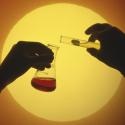
Most Christians are encouraged to practice self-examination (i.e., חֶשְׁבּוֹן הַנֶּפֶשׁ) before partaking of the elements of the Lord's Table (i.e., the commemoration of Yeshua's last Passover Seder that prefigured His sacrifice as the Lamb of God who takes away the sins of the world). "Let a person examine himself first (δοκιμάζω - test for authenticity), and then he may eat of the bread and drink from the cup. For anyone who eats and drinks without discerning the body eats and drinks condemnation (κρίμα) on himself" (1 Cor. 11:28-29). Now while it is assuredly true that we should examine ourselves before this ritual act, self-examination and confession should be part of our everyday lives as followers of the Messiah. The unexamined life -- especially as a Christian -- is not worth living, and the practice of suppressing the truth about our sinful condition can lead to self-deception and even death itself (1 Cor. 11:30). "But if we would judge ourselves, we should not be judged by the Lord" (1 Cor. 11:31). "If we say we have no sin, we deceive ourselves, and the truth is not in us; if we confess our sins, he is faithful and just to forgive us our sins and to cleanse us from all unrighteousness" (1 John 1:7-8). "Therefore, confess (ἐξομολογέω, lit. 'confess out') your sins to one another and pray for one another, that you may be healed" (James 5:16).
Life is a serious business, friends, and it is also a test. It is "God who tests our hearts" (1 Thess. 2:4). Yeshua said, "I am he who searches hearts and minds, and I will repay each of you according to your deeds" (Rev. 2:23). We have one opportunity to live for Yeshua in this life, and the fact that we will each face a day of judgment before the LORD should sober us to sanctity. God holds us responsible for what we think and believe (Acts 17:30-31), and this implies that we have a moral and spiritual duty to think clearly and not abuse our minds (Phil. 4:8; Rom. 12:2). It is the fear of the LORD (יִרְאַת יהוה) that is the beginning of wisdom and knowledge (Psalm 111:10; Prov. 1:7; 9:10). "By the fear of the Lord men depart from evil" (Prov. 16:16). The fear of the LORD is hatred of evil, and therefore, those who love the LORD are called to hate evil (Prov. 8:13; Psalm 97:10). Sin always cheats us of the good. "Blessed is the man that endures testing: for when he has been approved (δόκιμος), he shall receive the crown of life (τὸν στέφανον τῆς ζωῆς) that the Lord has promised to those who love him" (James 1:12).
Are you living in conscious awareness that life is a test and that you will one day stand before Yeshua to give account for every detail of your life? Are you mindful of eternity and of the inevitability of your own personal judgement day? If this causes you anxiety, what do you need to do differently in your life so that you may have confidence for that day? "Therefore we labor... to be well pleasing to Him" (2 Cor. 5:9). We must strive to "lay aside every weight, and the sin which doth so easily beset us" in order to be unhindered in our walk with God (Heb. 12:1).
There is great glory coming your way, chaverim! May God help you "to walk in a manner worthy of God, who calls you into his own kingdom and glory" (1 Thess. 2:12). May you be "fully pleasing to him, bearing fruit in every good work and increasing in the knowledge of God. May you be strengthened with all power, according to his glorious might, for all endurance and patience with joy, giving thanks to the Father, who has qualified you to share in the inheritance of the saints in light" (Col. 1:10-12).
Shabbat Shalom, chaverim...
 |
|
|


































